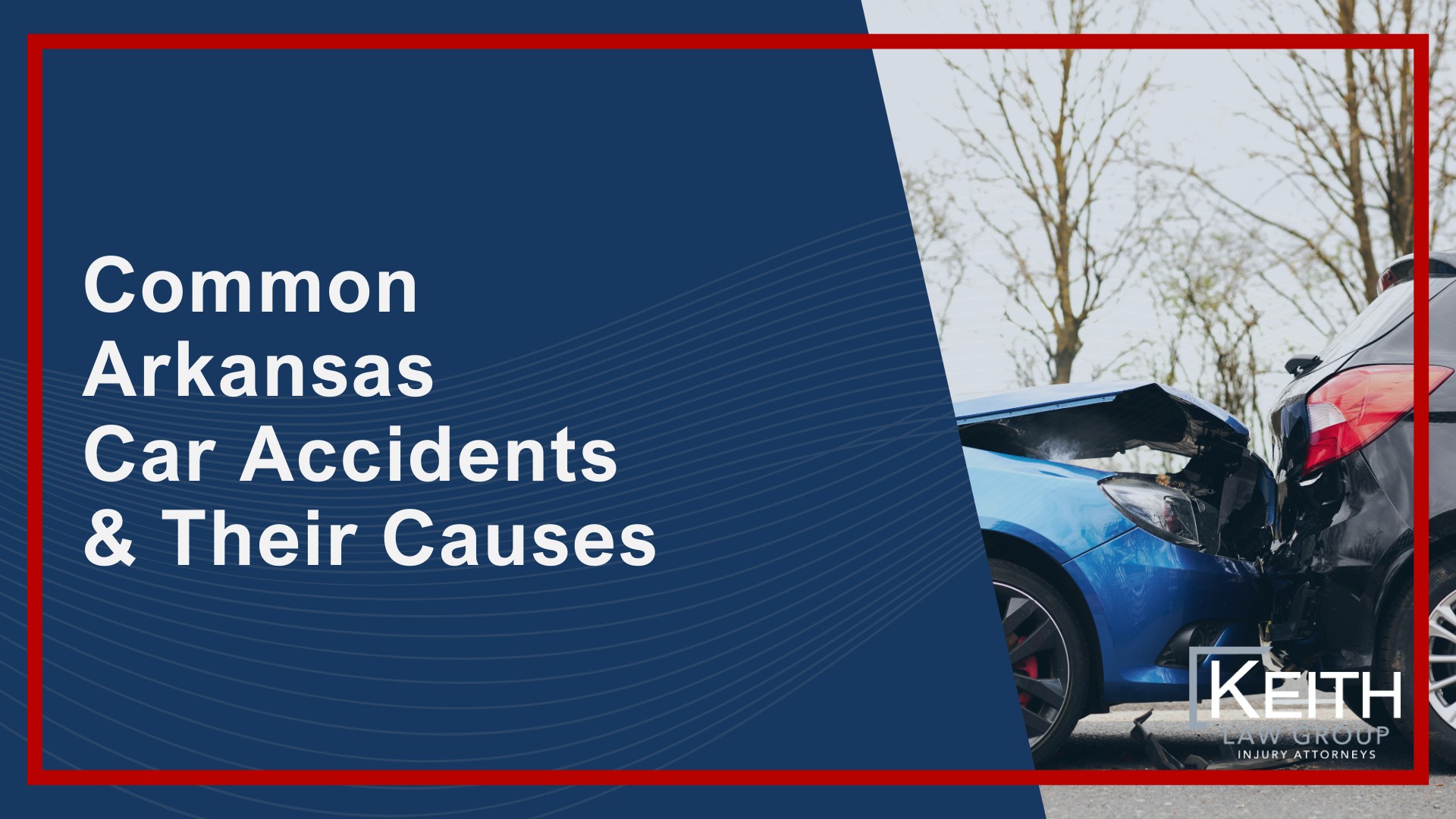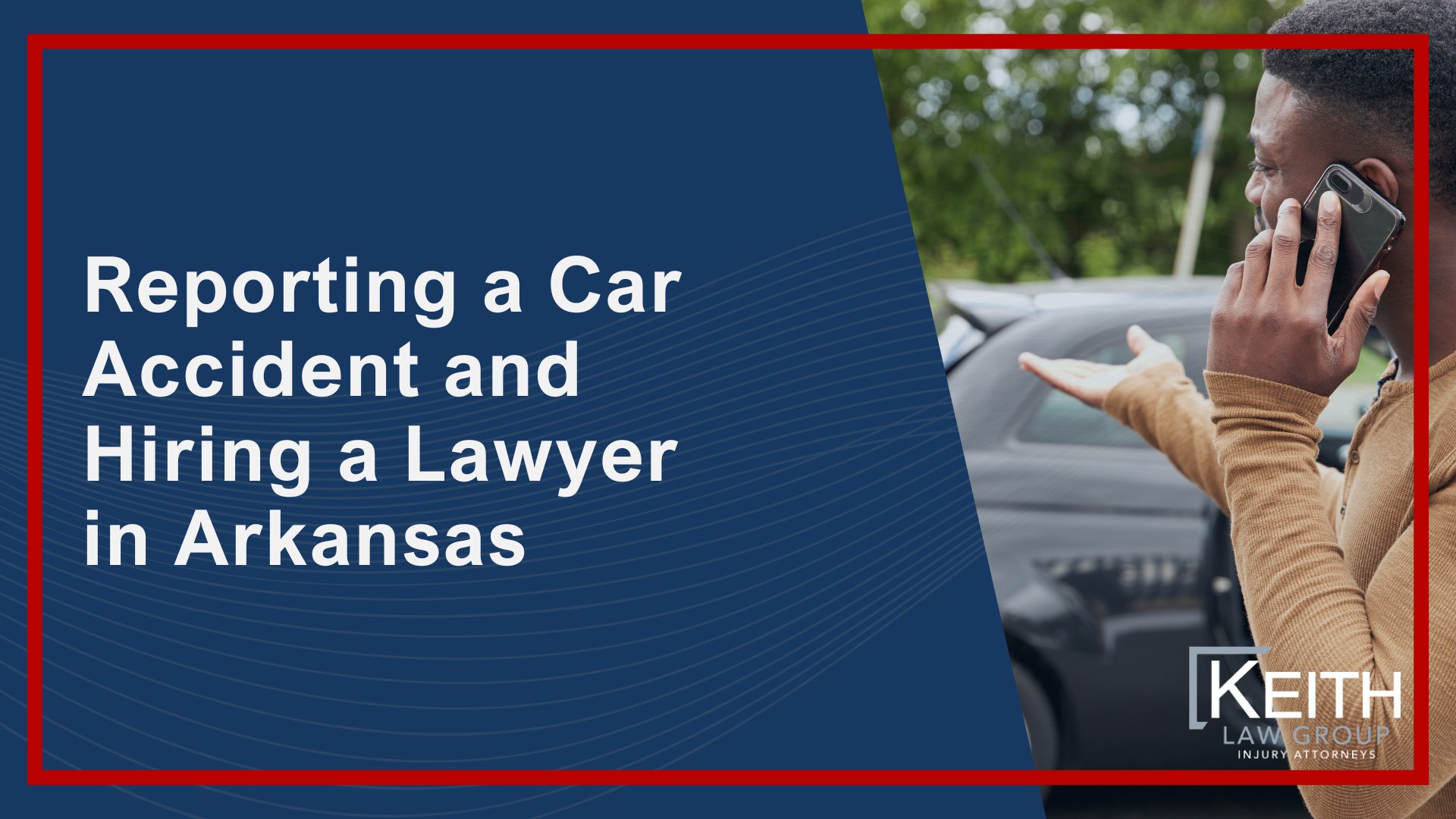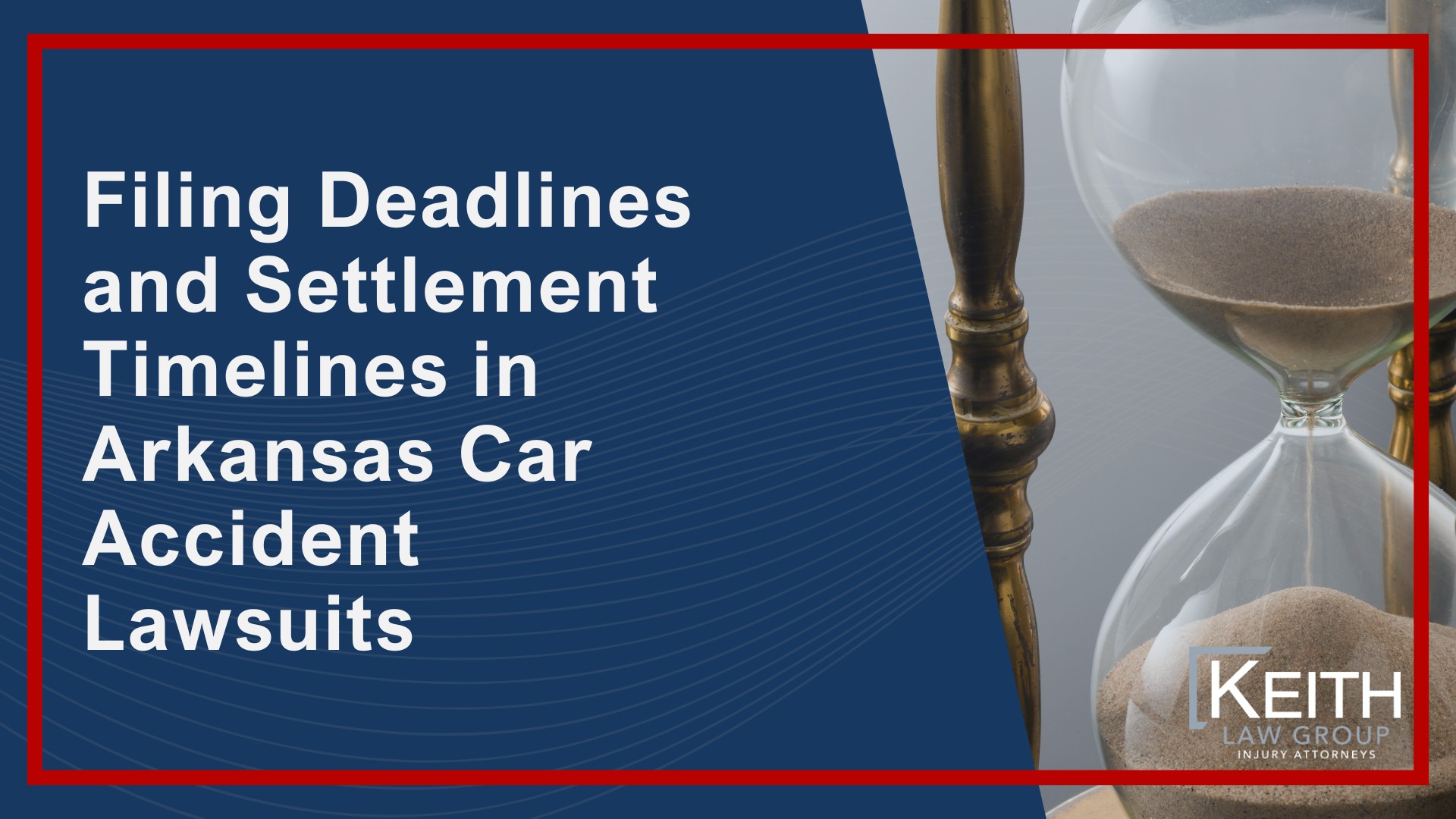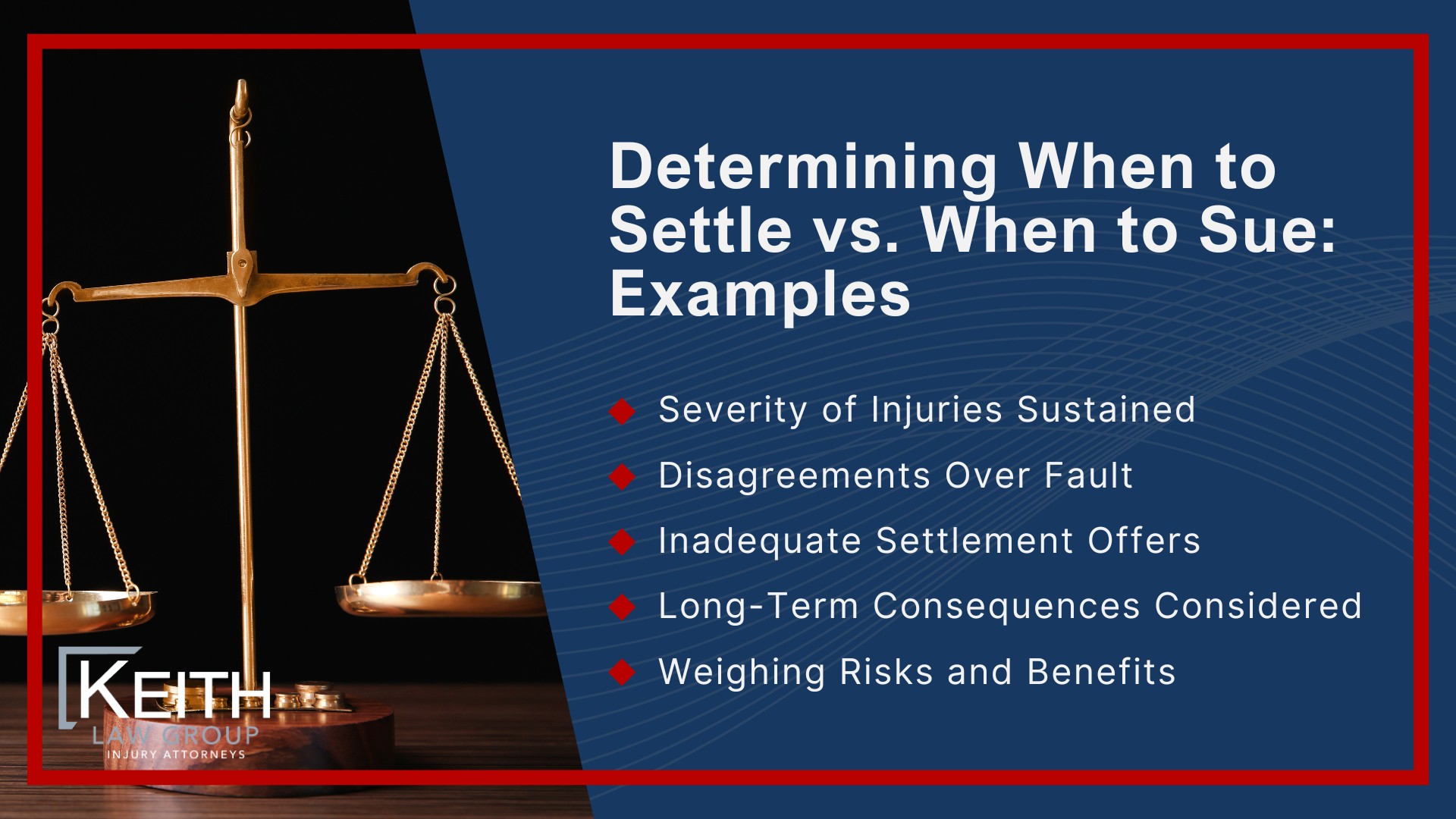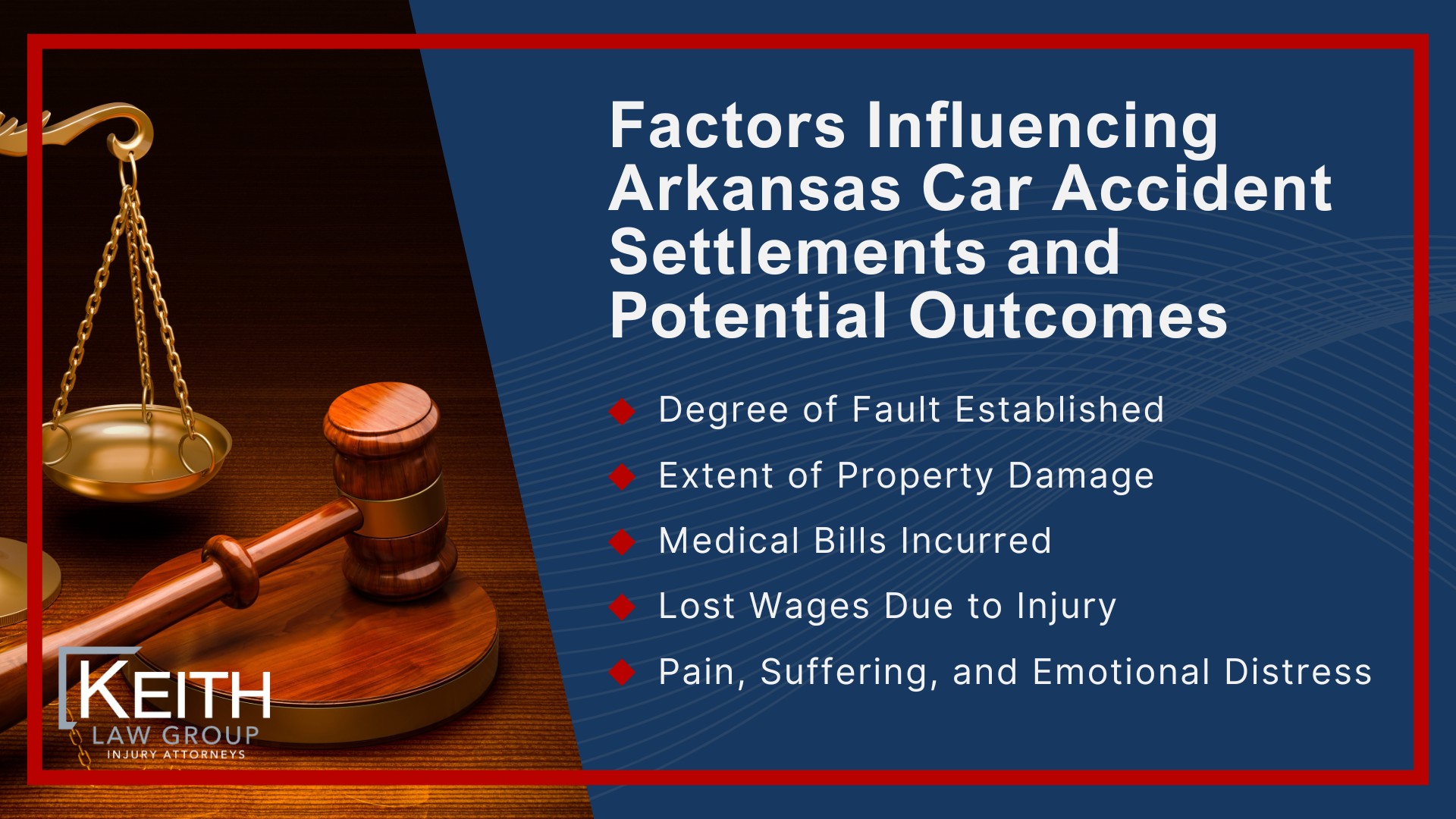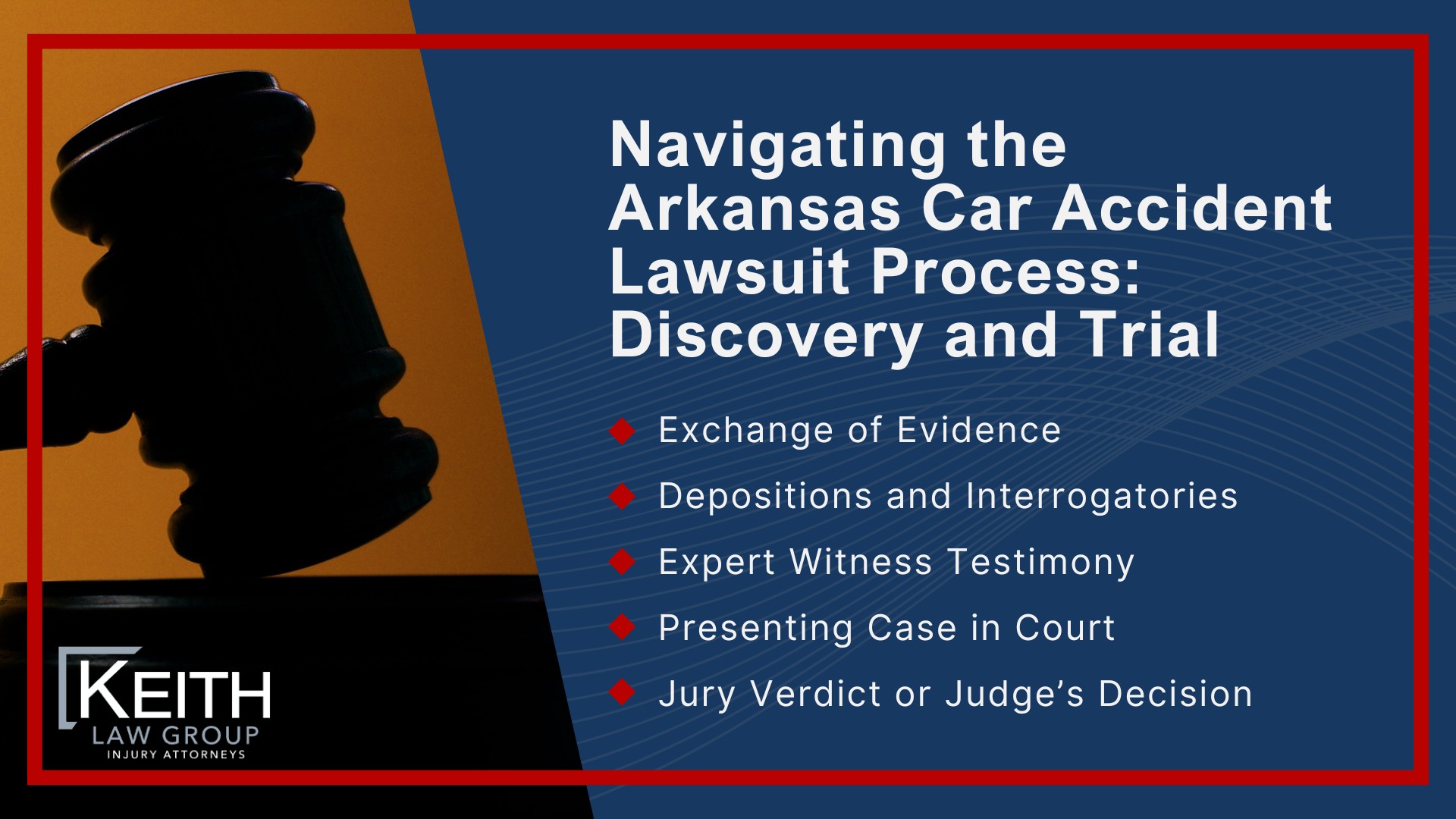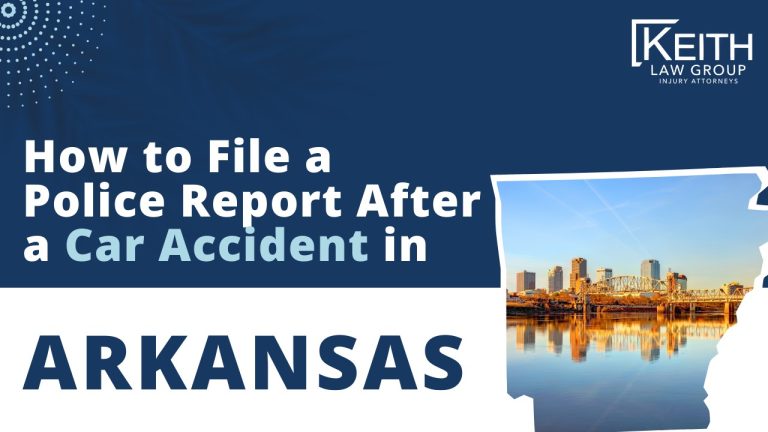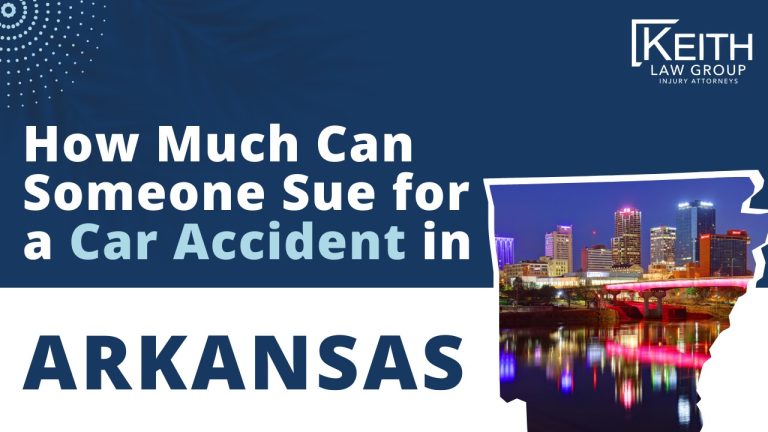- Published:
- Last Updated: February 17th, 2026

Attorney Sean T. Keith has been a personal injury lawyer for 30+ years, a nationally recognized Top 100 Trial Lawyer, and top car accident lawyer & motor vehicle accident lawyer in Arkansas.
Legally Reviewed
This article has been written and reviewed for legal accuracy and clarity by the team of writers and attorneys at Keith Law Group and is as accurate as possible. This content should not be taken as legal advice from an attorney. If you would like to learn more about our owner and experienced injury lawyer, Sean T. Keith, you can do so here.
Fact-Checked
Keith Law Group does everything possible to make sure the information in this article is up to date and accurate. If you need specific legal advice about your case, contact us. This article should not be taken as advice from an attorney.
Sean Keith's Accollades & Practice Areas He Specializes In
- Over $20 Million recovered in Medical Device Injury Lawsuits.
- Over $13 Million recovered in Car Accident Lawsuits and other Motor Vehicle Accident Lawsuits.
- Over $100 Million recovered in total on behalf of clients.
- Sean represents clients in cases involving personal injuries, car accidents, motorcycle accidents, truck accidents, wrongful death, slip and falls, nursing home abuse cases, nursing home elopement cases, and more.
The Ultimate Guide to Arkansas Car Accident Lawsuits
Did you know that navigating the complex world of car accident lawsuits in Arkansas can be a daunting task?
Understanding state laws, potential compensation for victims, and the role of insurance companies is crucial for anyone involved in a car accident case.
Personal injury attorneys and personal injury lawyers can help you with your personal injury claim and guide you through the process to reach a personal injury settlement.
Arkansas has its own unique set of rules, making it essential for victims to be well-informed about their rights and the legal process.

Whether it’s a minor car accident case or major personal injury lawsuit, personal injury attorneys and personal injury lawyers can help you navigate this challenging landscape.
Insurance companies may not always have your best interest at heart, so knowing how to proceed is key.
The legal process surrounding personal injury lawsuits can seem overwhelming, especially when dealing with physical injuries or emotional trauma from a car accident.
This is where seeking professional help from skilled lawyers becomes invaluable.
A knowledgeable attorney with experience handling car accident cases in Arkansas will guide you through every step of the way, including dealing with insurance adjusters and court action, ensuring that you receive the compensation you deserve for your insurance claim.
By arming yourself with knowledge, expertise, and fact-based answers to questions, you’ll be better equipped to tackle any challenges that come your way during this difficult time at the law firm, ensuring the best outcome for your client.
So buckle up as we take a closer look at what’s involved in the success of most car accident lawsuits, as well as the common challenges presented in most car accident cases.
Table of Contents
Common Arkansas Car Accidents and Their Causes
Rear-end Collisions
Rear-end collisions are one of the most common types of car accidents in Arkansas, often involving insurance company questions and potential court action.
These occur when a driver fails to maintain a safe distance behind another vehicle, resulting in a crash.
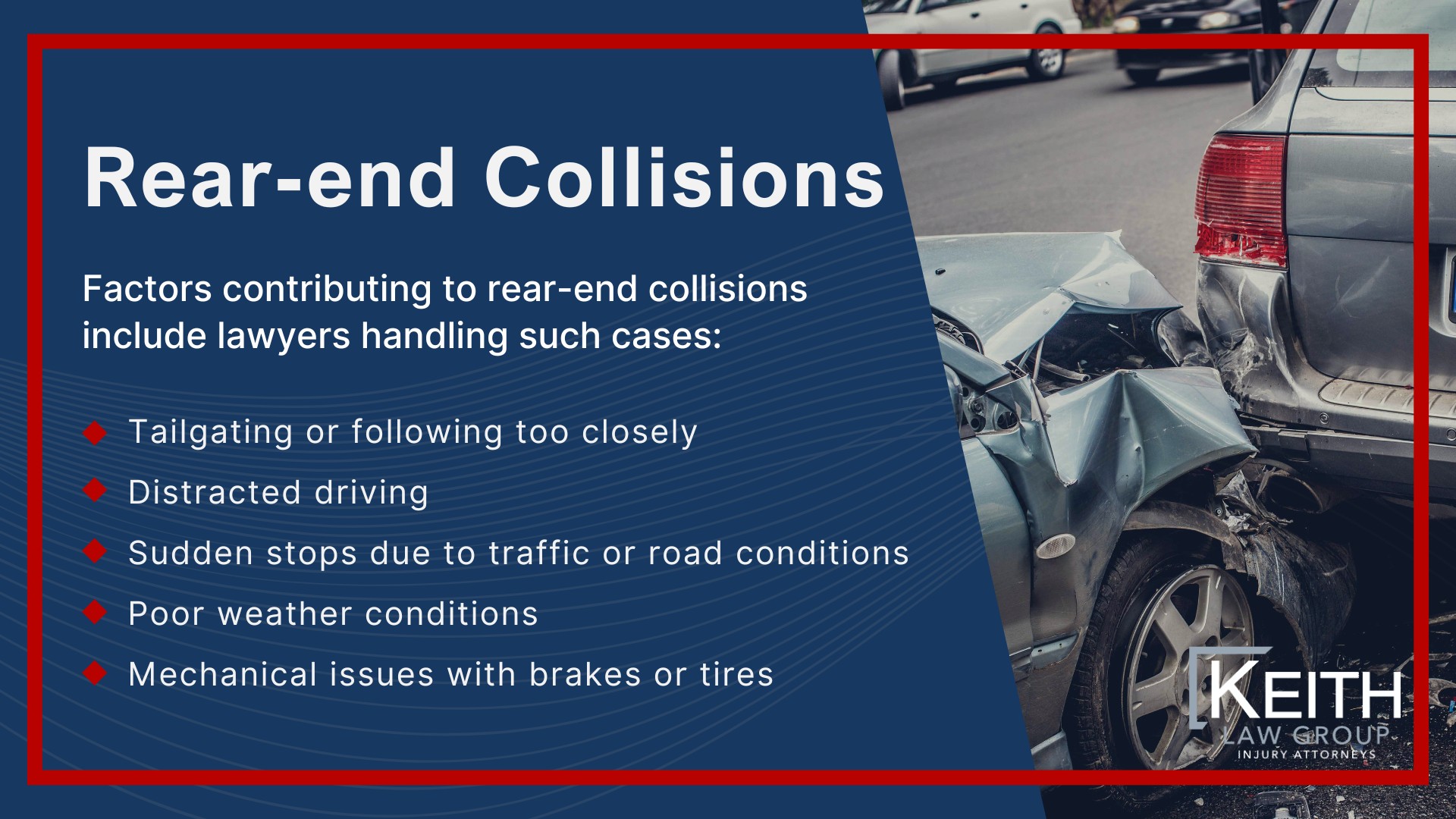
Factors contributing to rear-end collisions include lawyers handling such cases:
- Tailgating or following too closely
- Distracted driving (e.g., texting, eating, or adjusting the radio)
- Sudden stops due to traffic or road conditions
- Poor weather conditions (e.g., rain, snow, or fog) that reduce visibility and increase stopping distances can be a significant factor in a car accident case. It’s essential to consider these matters and any related questions when examining the facts of such cases.
- Mechanical issues with brakes or tires
In many cases, the the at fault driver is considered responsible for the accident. However, it’s essential to gather evidence such as photos of the crash scene, witness statements, and police reports to support your car accident lawsuit.
Lawyers can help present this evidence to a jury during court action, and a judge will ultimately determine responsibility.
T-bone Accidents at Intersections
T-bone accidents often occur at intersections when one vehicle crashes into the side of another vehicle.
These can be particularly dangerous because there is much less protection for occupants on the impacted side.
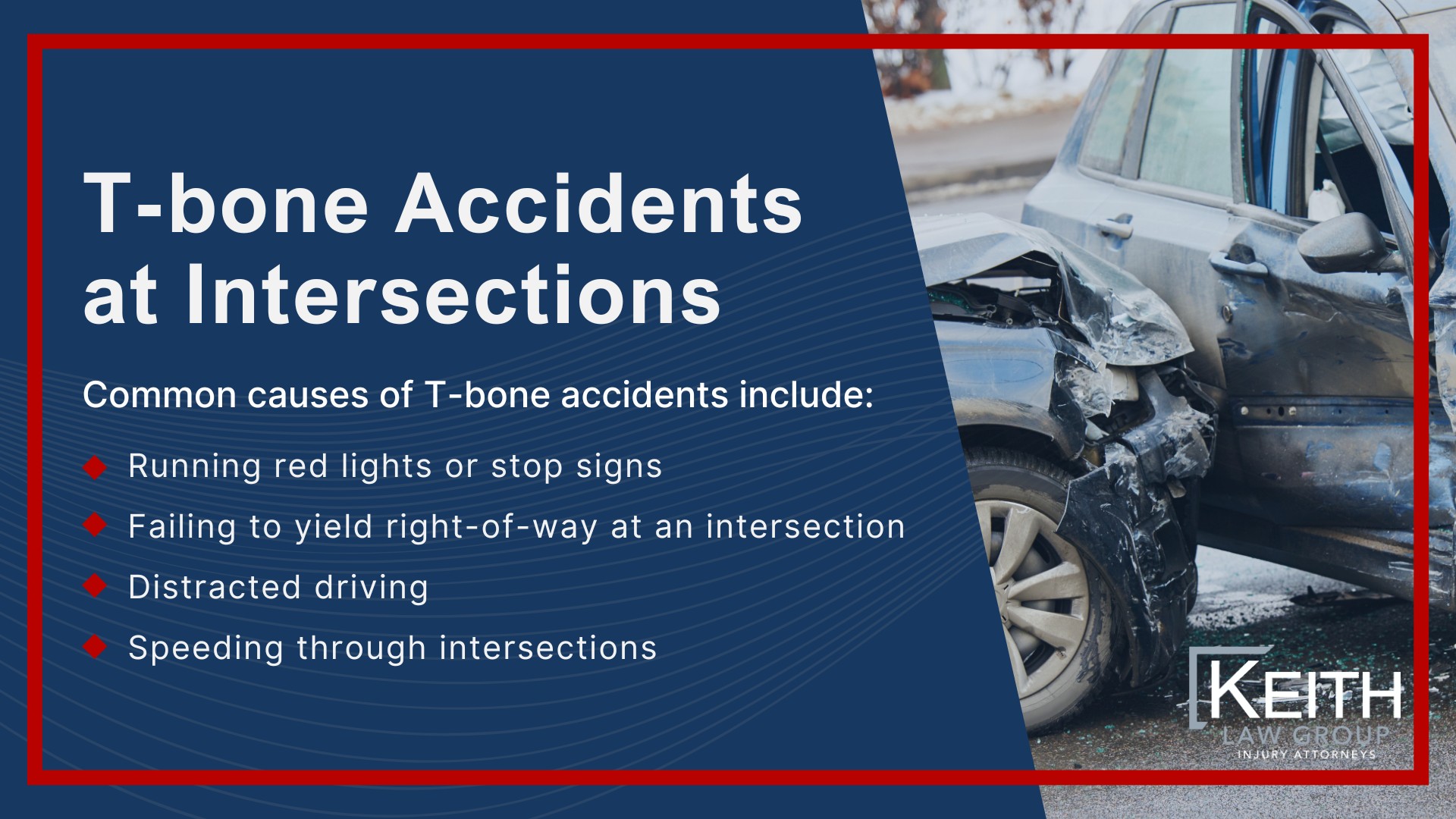
Common causes of T-bone accidents include:
- Running red lights or stop signs
- Failing to yield right-of-way at an intersection
- Distracted driving (e.g., using a cell phone)
- Speeding through intersections
To prove fault in a T-bone accident case and support court action, it’s crucial to collect evidence such as surveillance footage from nearby businesses and traffic cameras.
This can help establish which driver had the right-of-way and who was at fault for causing the crash, providing lawyers with facts that can be presented to a jury.
Head-on Crashes on Highways
Head-on crashes are among the deadliest types of car accidents due to their high-speed nature and direct impact between vehicles.
They often happen on highways where drivers may become disoriented or lose control of their vehicles.
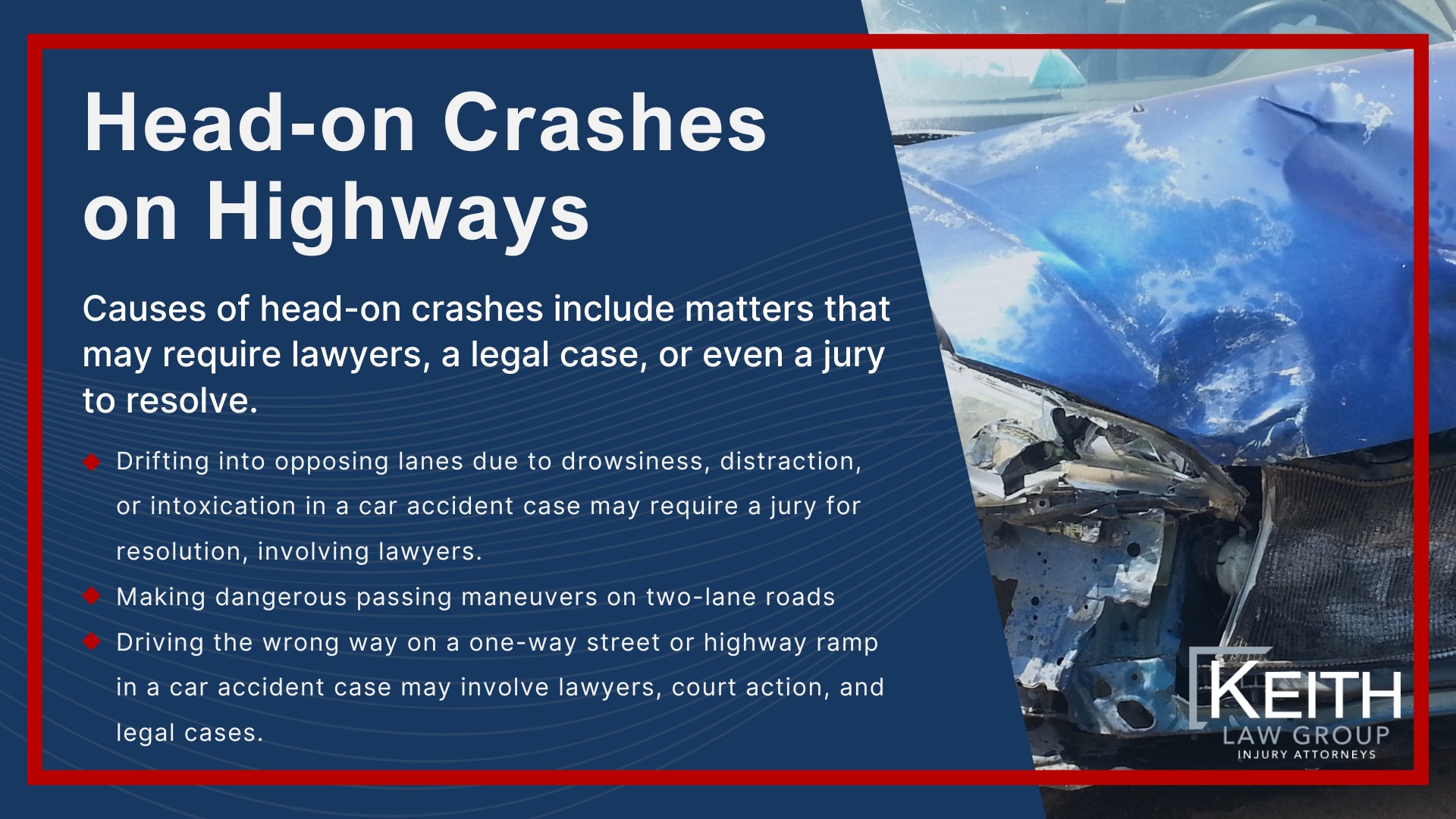
Causes of head-on crashes include matters that may require lawyers, a legal case, or even a jury to resolve.
- Drifting into opposing lanes due to drowsiness, distraction, or intoxication in a car accident case may require a jury for resolution, involving lawyers.
- Making dangerous passing maneuvers on two-lane roads
- Driving the wrong way on a one-way street or highway ramp in a car accident case may involve lawyers, court action, and legal cases.
To build a strong car accident legal case, it’s vital to gather evidence such as skid marks, vehicle damage patterns, and witness statements that can help determine fault in head-on crashes for a successful court action, jury resolution.
Distracted Driving Incidents
Distracted driving is a leading cause of car accidents in Arkansas and often leads to legal cases.
Drivers who engage in activities that take their attention away from the road put themselves and others at risk, potentially facing a jury for resolution.
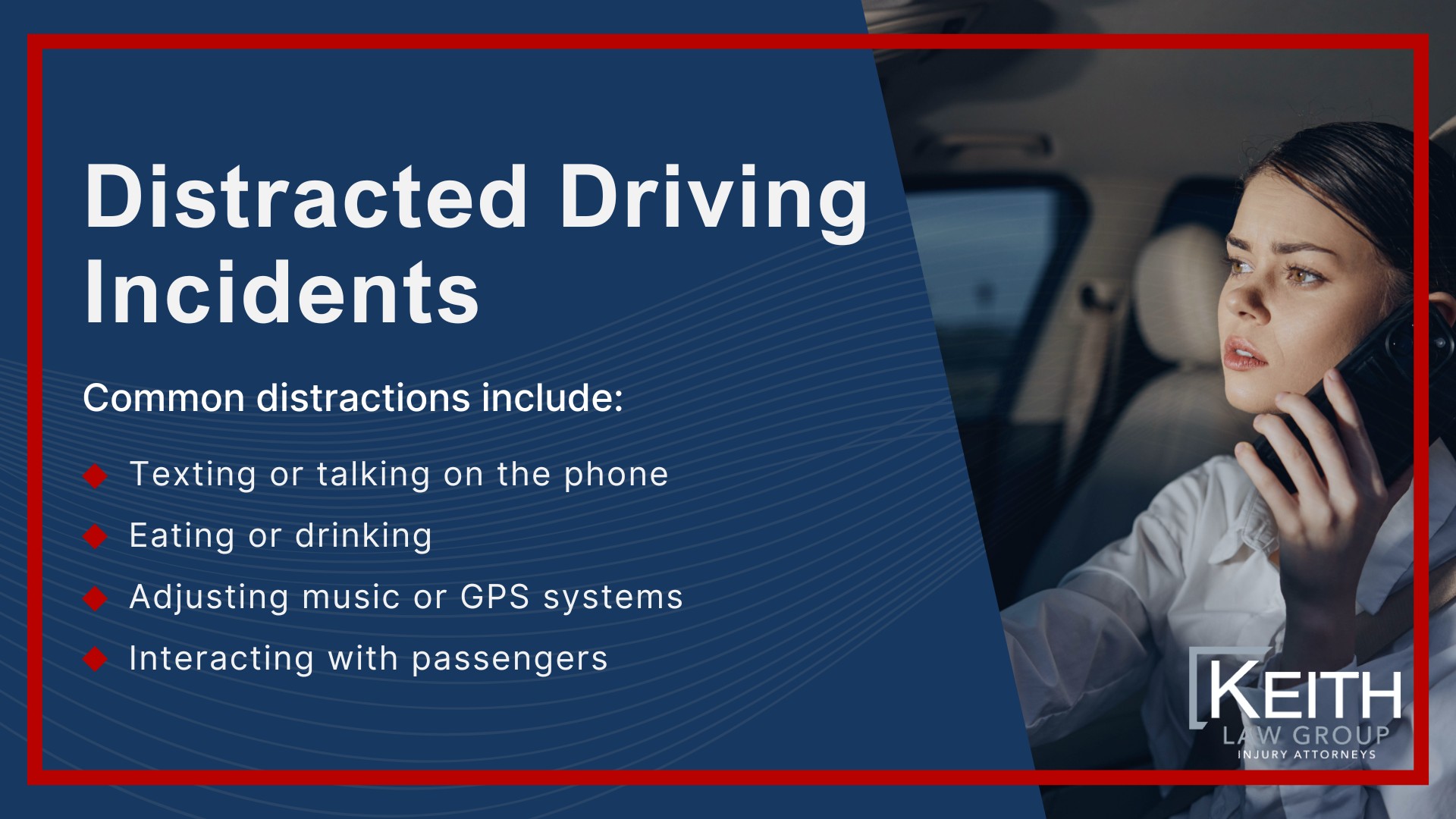
Common distractions include:
- Texting or talking on the phone
- Eating or drinking
- Adjusting music or GPS systems
- Interacting with passengers
Proving fault in distracted driving incidents can be challenging during the car accident lawsuit process.
However, obtaining cell phone records, eyewitness accounts, and other evidence can help establish that the negligent driver was not paying attention before the crash occurred.
This can be crucial in a court action, as presenting a strong legal case to the jury may determine the outcome of the lawsuit.
Drunk Driving Accidents
Drunk driving accidents are another major cause of car crashes in Arkansas, often leading to a jury being involved in a legal case.
Additionally, the likelihood of a hit-and-run accident increases when a driver is under the influence of alcohol
Alcohol impairs a driver’s judgment, reaction time, and coordination – all crucial factors for safe driving and important considerations for the resolution of such cases.

Signs of drunk driving may include:
- Swerving or weaving between lanes
- Excessive speeding or driving too slowly
- Running red lights or stop signs
- Failing to use turn signals properly
In cases involving drunk drivers or hit and run accidents, proving fault in court action is often more straightforward due to the clear violation of traffic laws and potential criminal charges against the intoxicated driver, leading to a resolution that a jury can easily understand.
By understanding these common types of car accidents and their causes in Arkansas, you’ll be better prepared to navigate your car accident lawsuit process effectively.
Always remember to gather as much evidence as possible to support your car insurance claim and consult with an experienced attorney for guidance throughout this complex legal journey, including any potential court action or dealing with a jury.
Reporting a Car Accident and Hiring a Lawyer in Arkansas
Legal Requirement to Report Accidents
In Arkansas, you’re legally required to report any car accident that results in injury, death, or property damage over $1,000 to avoid potential court action.
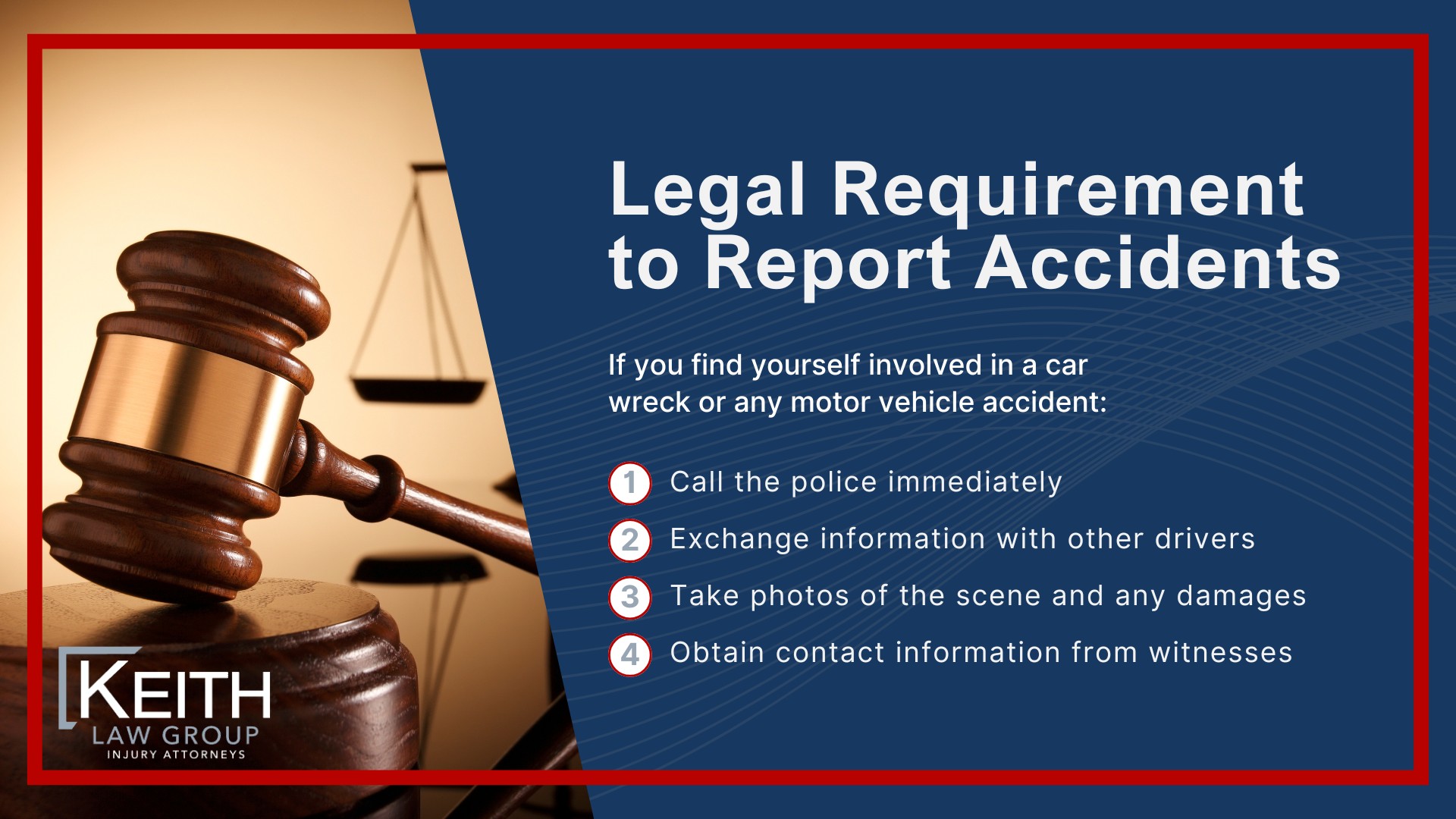
If you find yourself involved in a car wreck or any motor vehicle accident:
- Call the police immediately
- Exchange information with other drivers
- Take photos of the scene and any damages
- Obtain contact information from witnesses
Failing to report an accident could lead to fines, court action, or even criminal charges.
Moreover, having a police report or accident report made is crucial for your car accident legal case and may be necessary for a jury to assess the situation in a lawsuit.
Gathering Evidence at the Scene
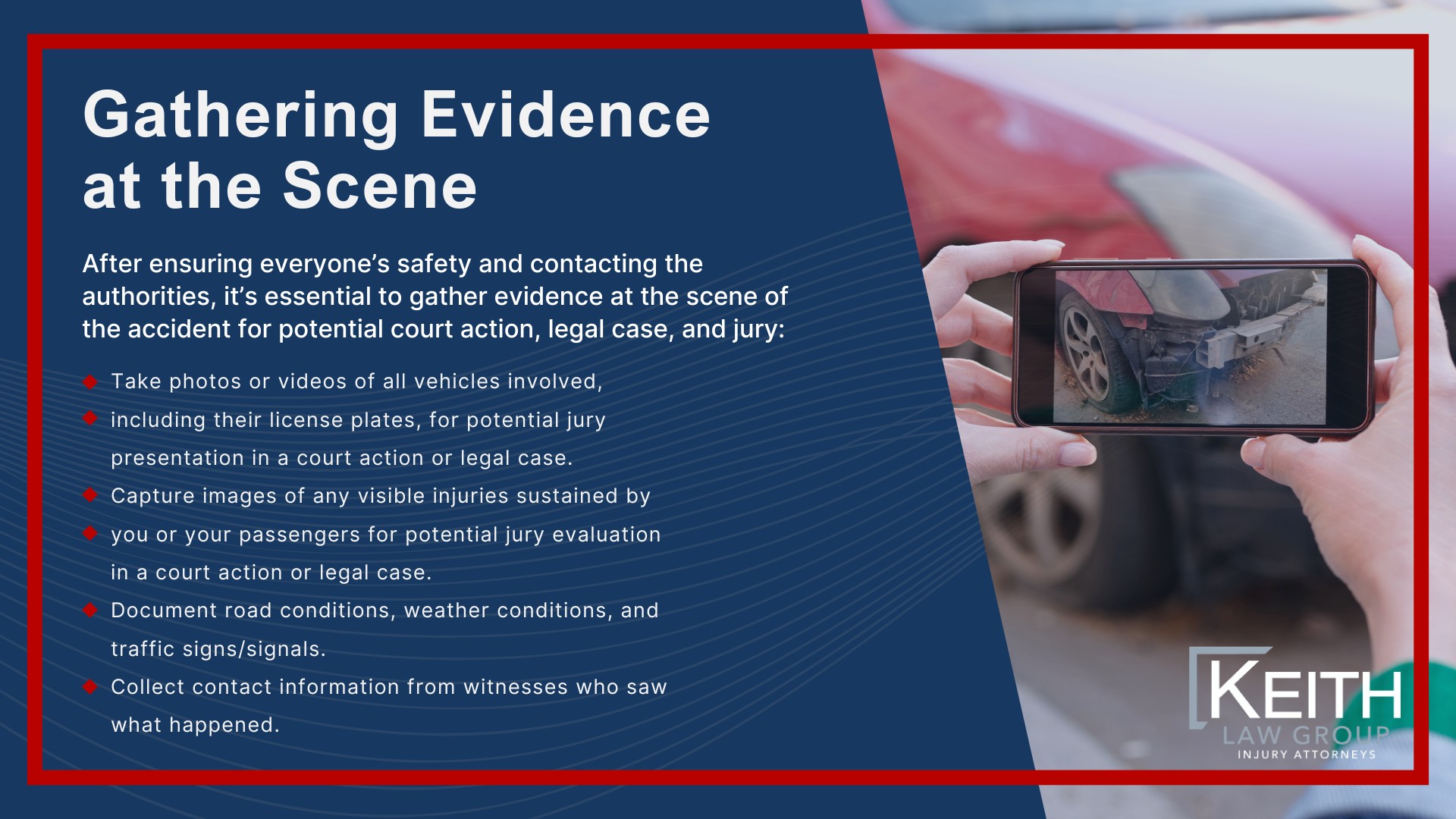
After ensuring everyone’s safety and contacting the authorities, it’s essential to gather evidence at the scene of the accident for potential court action, legal case, and jury:
- Take photos or videos of all vehicles involved, including their license plates, for potential jury presentation in a court action or legal case.
- Capture images of any visible injuries sustained by you or your passengers for potential jury evaluation in a court action or legal case.
- Document road conditions, weather conditions, and traffic signs/signals.
- Collect contact information from witnesses who saw what happened.
This evidence can significantly strengthen your case when pursuing a car accident lawsuit in Arkansas, potentially convincing a jury to take action in your favor.
Finding an Experienced Attorney

To increase your chances of winning your car accident legal case and impressing the jury in Arkansas:
- Search for attorneys who specialize in personal injury law and have experience handling car accidents cases.
- Look for lawyers with positive reviews from previous clients.
- Check if they are members of reputable legal organizations like American Association for Justice, National Trial Lawyers Top 100, or jury associations.
Remember that hiring an experienced attorney will greatly improve your odds of receiving fair compensation for your injuries and damages in a jury trial for your legal case.
Initial Consultation with a Lawyer
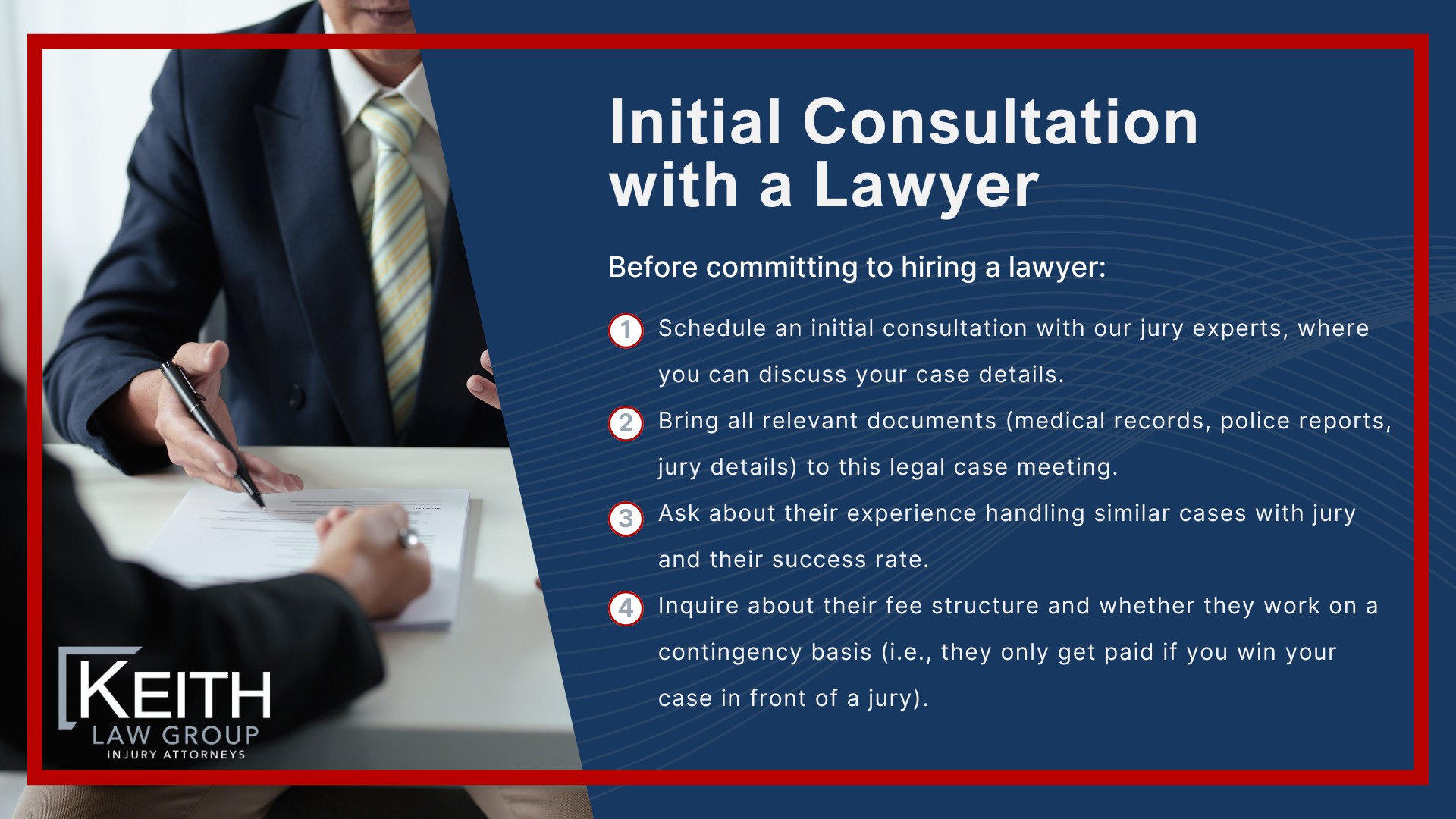
Before committing to hiring a lawyer:
- Schedule an initial consultation with our jury experts, where you can discuss your case details.
- Bring all relevant documents (medical records, police reports, jury details) to this legal case meeting.
- Ask about their experience handling similar cases with jury and their success rate.
- Inquire about their fee structure and whether they work on a contingency basis (i.e., they only get paid if you win your case in front of a jury).
The initial consultation is crucial to determine if a car accident lawyer is the right fit for your car accident legal case and potential jury in Arkansas.
Assessing Case Strength
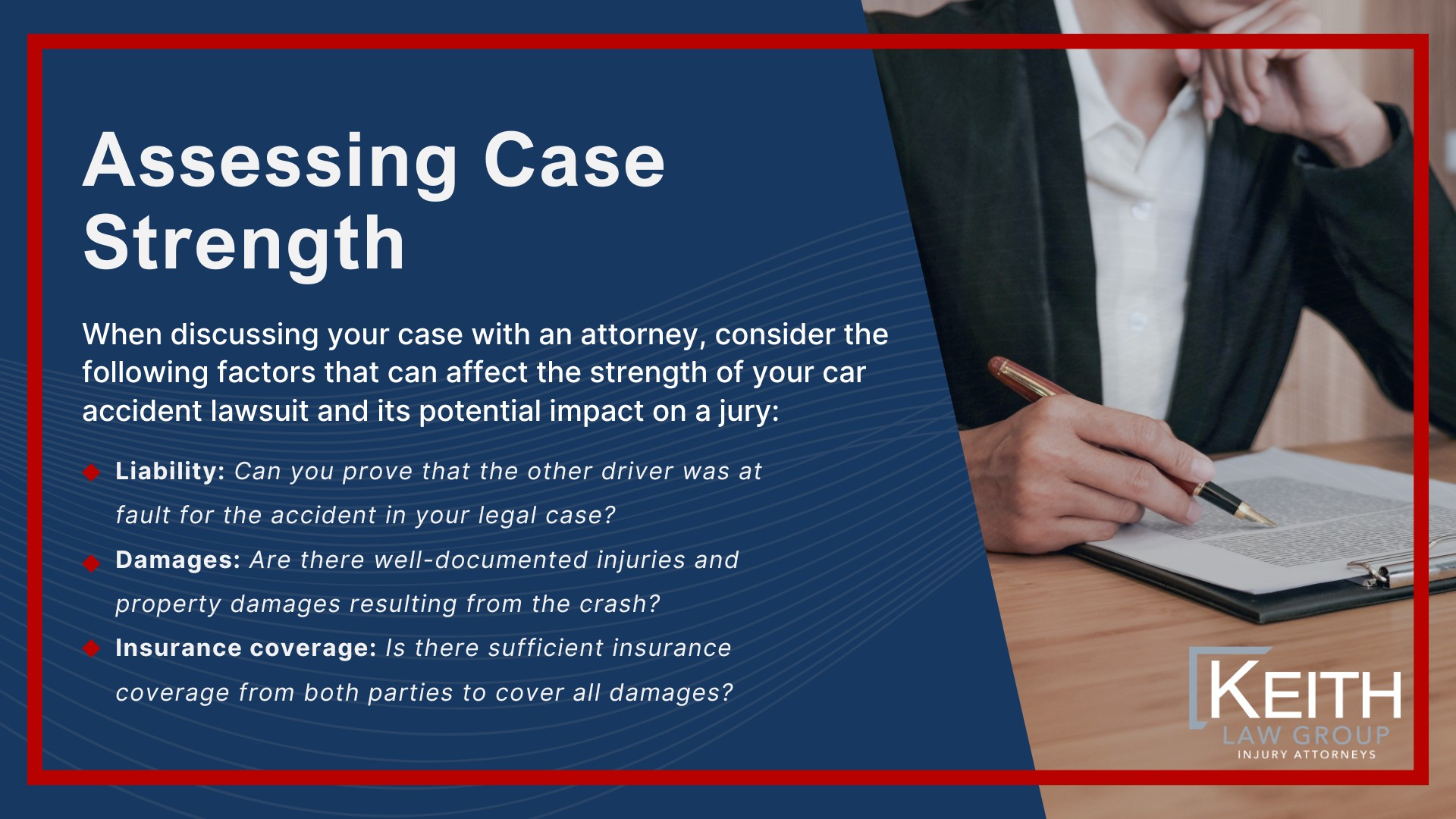
When discussing your case with an attorney, consider the following factors that can affect the strength of your car accident lawsuit and its potential impact on a jury:
- Liability: Can you prove that the other driver was at fault for the accident in your legal case?
- Damages: Are there well-documented injuries and property damages resulting from the crash?
- Insurance coverage: Is there sufficient insurance coverage from both parties to cover all damages?
A strong case will have clear evidence supporting these factors, which will increase your chances of winning a favorable settlement or verdict.
It’s essential to file a car accident lawsuit within the specific statute of limitations for car accidents in your state, as failing to do so could result in losing the opportunity to seek compensation for damages.
Filing Deadlines and Settlement Timelines in Arkansas Car Accident Lawsuits
Statute of Limitations: 3 Years
Arkansas has a three-year statute of limitations for car accident lawsuits. This means that for most car accident claims you have exactly three years from the date of the accident to file your lawsuit.
If you fail to file within this timeframe, you may lose your right to pursue compensation for your injuries and damages.
It’s important to note that this deadline applies specifically to personal injury claims resulting from car accidents. Other types of claims, such as property damage, may have different deadlines.
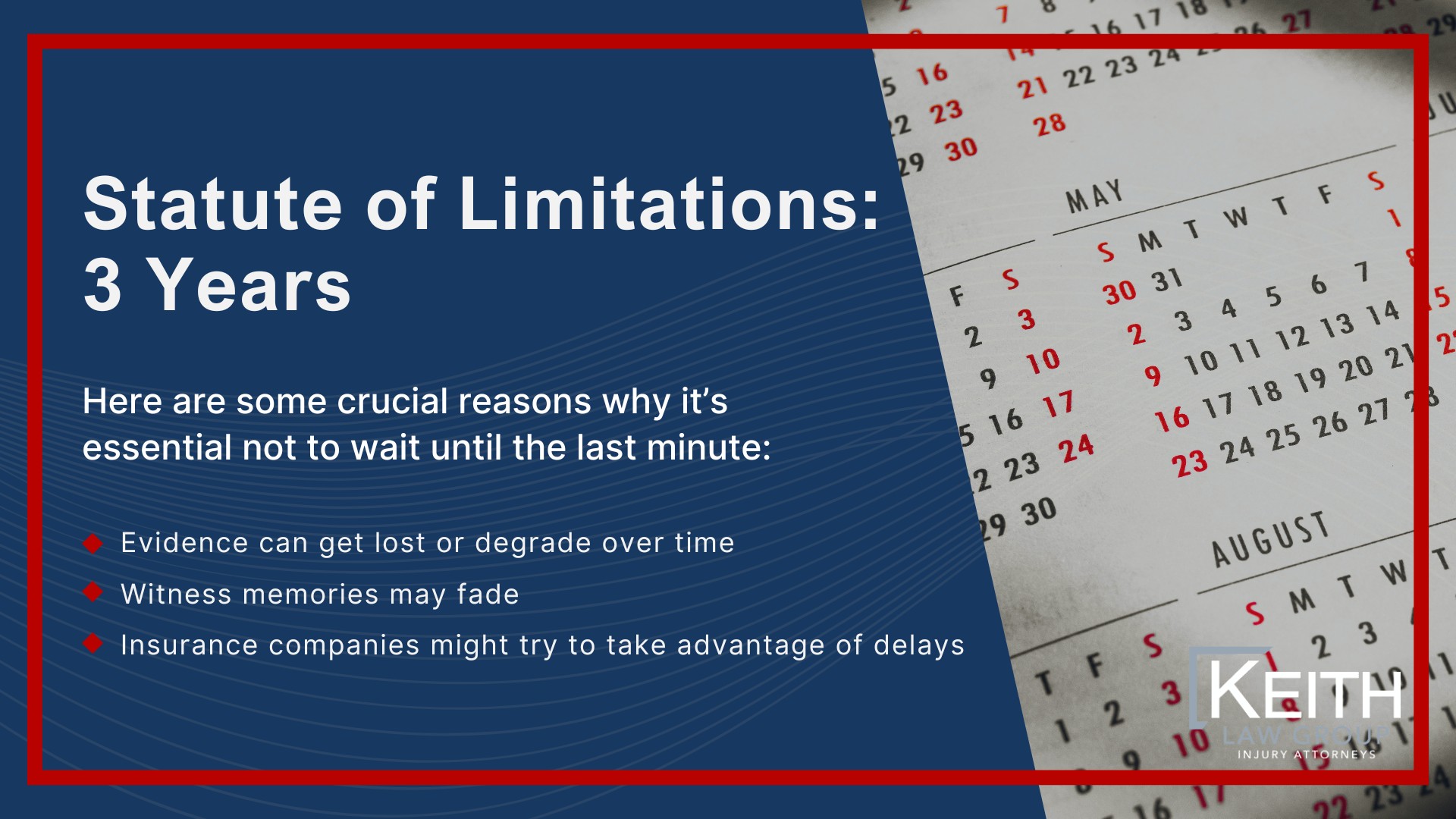
Here are some crucial reasons why it’s essential not to wait until the last minute:
- Evidence can get lost or degrade over time
- Witness memories may fade
- Insurance companies might try to take advantage of delays
Exceptions to Filing Deadlines
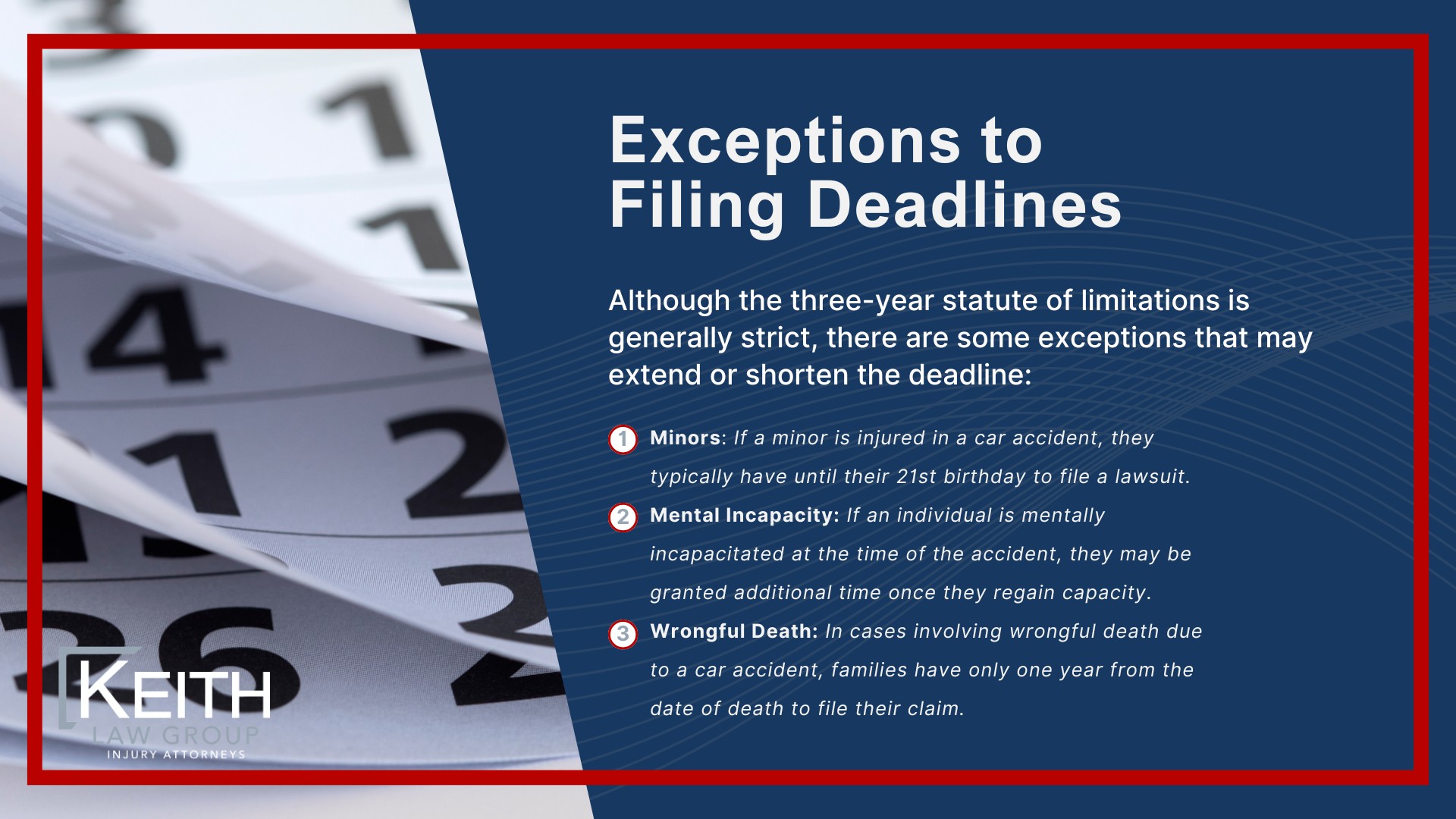
Although the three-year statute of limitations is generally strict, there are some exceptions that may extend or shorten the deadline:
- Minors: If a minor is injured in a car accident, they typically have until their 21st birthday to file a lawsuit.
- Mental Incapacity: If an individual is mentally incapacitated at the time of the accident, they may be granted additional time once they regain capacity.
- Wrongful Death: In cases involving wrongful death due to a car accident, families have only one year from the date of death to file their claim.
These exceptions can be complex and often require legal expertise to navigate properly.
Preparing Necessary Documents for Car Accident Claims
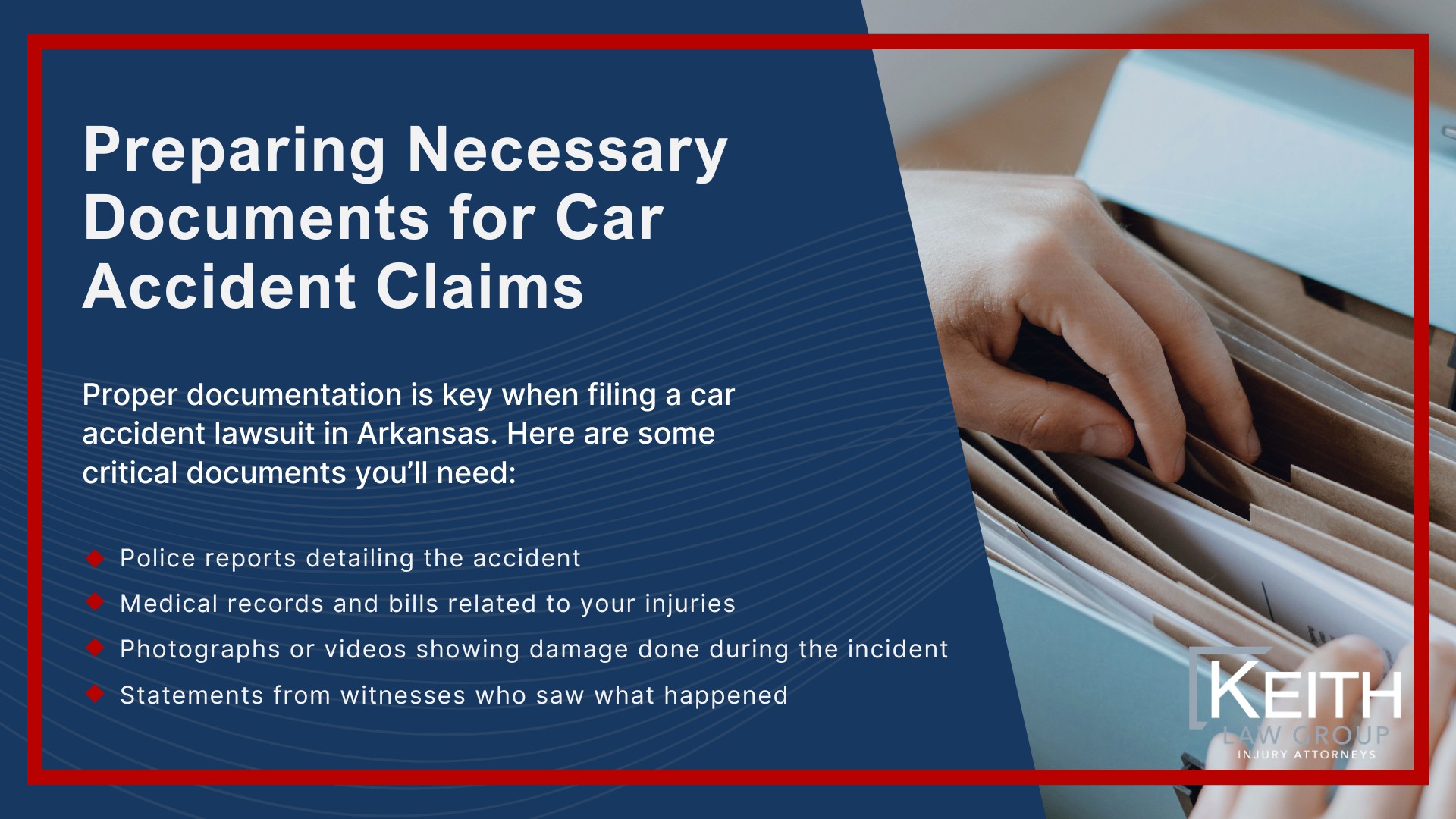
Proper documentation is key when filing a car accident lawsuit in Arkansas. Here are some critical documents you’ll need:
- Police reports detailing the accident
- Medical records and bills related to your injuries
- Photographs or videos showing damage done during the incident
- Statements from witnesses who saw what happened
Organizing these documents early on will help streamline your case and make it easier for your attorney to build a strong argument on your behalf.
Negotiating with the Insurance Company
Dealing with insurance companies can be one of the most challenging aspects of a car accident lawsuit.
Insurers often try to minimize payouts or deny claims altogether.
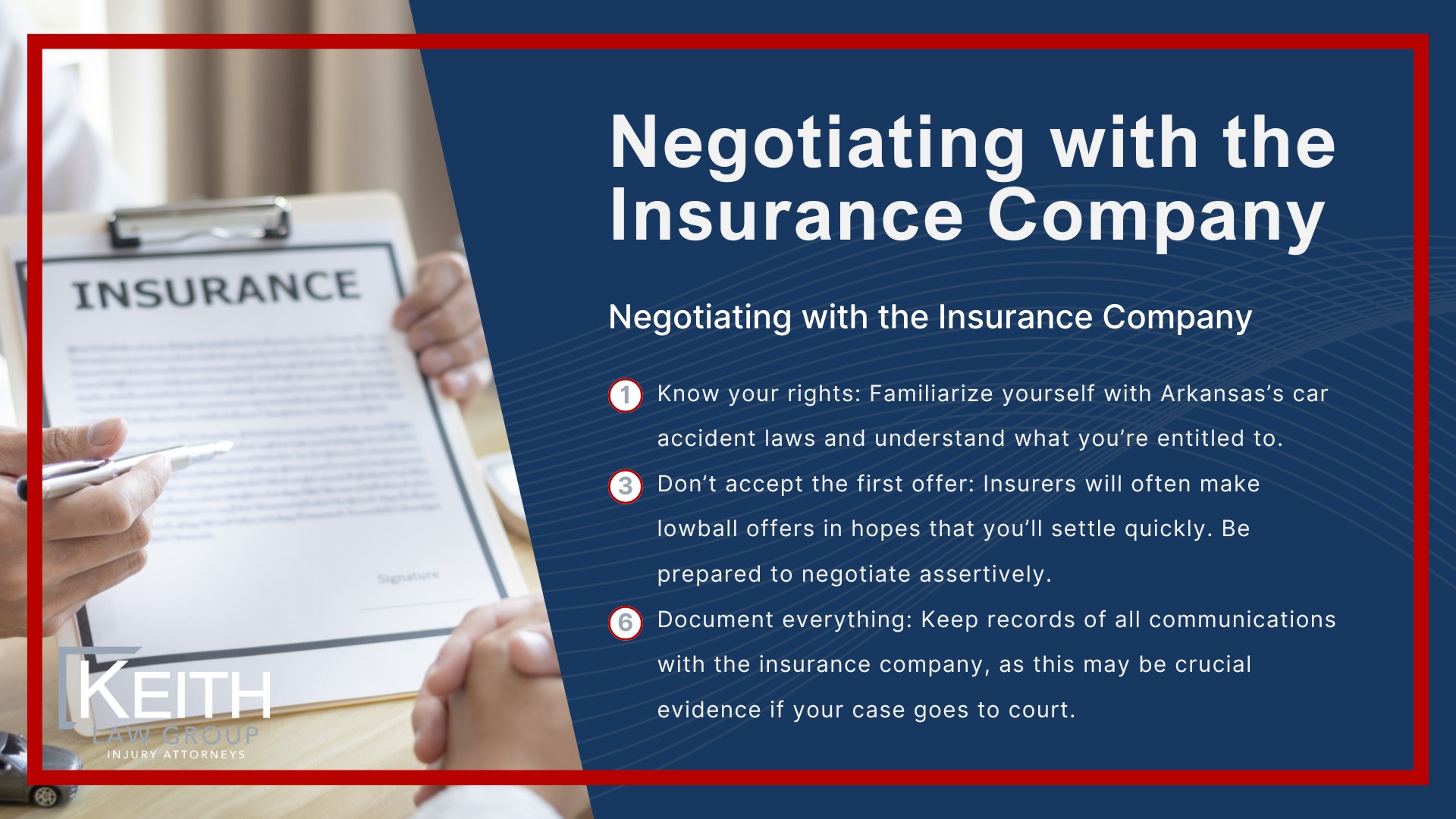
Here are some tips for negotiating with them:
- Know your rights: Familiarize yourself with Arkansas’s car accident laws and understand what you’re entitled to.
- Don’t accept the first offer: Insurers will often make lowball offers in hopes that you’ll settle quickly. Be prepared to negotiate assertively.
- Document everything: Keep records of all communications with the insurance company, as this may be crucial evidence if your case goes to court.
If negotiations stall or become contentious, it’s wise to consult an attorney who can advocate for your best interests.
Timeframe for Receiving Settlements
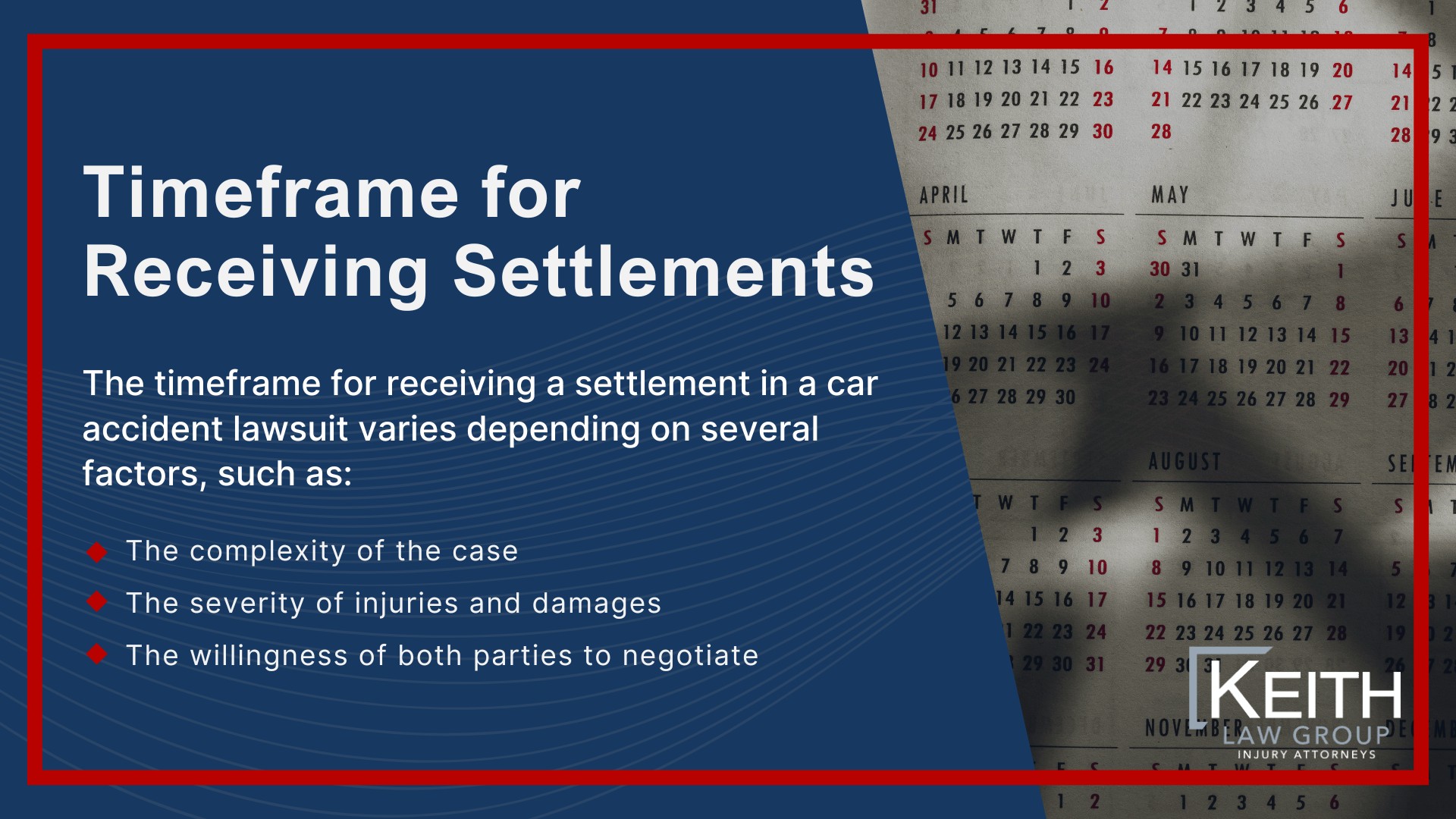
The timeframe for receiving a settlement in a car accident lawsuit varies depending on several factors, such as:
- The complexity of the case
- The severity of injuries and damages
- The willingness of both parties to negotiate
On average, settlements can take anywhere from several months to over a year after filing your claim.
However, each case is unique, and there’s no guaranteed timeline.
Understanding No-Fault Insurance and Personal Injury Protection (PIP) in Arkansas
At-fault insurance state
Arkansas is an at-fault insurance state, which means that the driver responsible for causing a car accident is also responsible for covering the damages and injuries resulting from the crash.
This system contrasts with no-fault states, where each driver’s insurance covers their own expenses regardless of who’s at fault.
In Arkansas, if you’re the person involved in a car accident, you’ll need to prove that the other party was at fault in order to receive compensation for your losses.
This process can involve gathering evidence like police reports, witness statements, and photographs of the scene.
PIP coverage not mandatory
Personal injury protection (PIP) is an optional form of insurance coverage available in some states that helps cover medical expenses and lost wages after a car accident.
In Arkansas, PIP coverage is not mandatory; drivers can choose whether or not to include it in their auto insurance policy.
However, even though PIP isn’t required by law in Arkansas, it can still be beneficial to have this additional coverage.
It can help cover medical expenses and lost wages while you’re waiting for your car accident lawsuit to be resolved.
Medical expenses covered by own policy
In an at-fault state like Arkansas, your own auto insurance policy typically covers your medical expenses up to your policy limits if you’re injured in a car accident.
This means that even if another driver caused the crash, you would first turn to your own insurer for compensation before seeking reimbursement from the at-fault driver’s insurer.
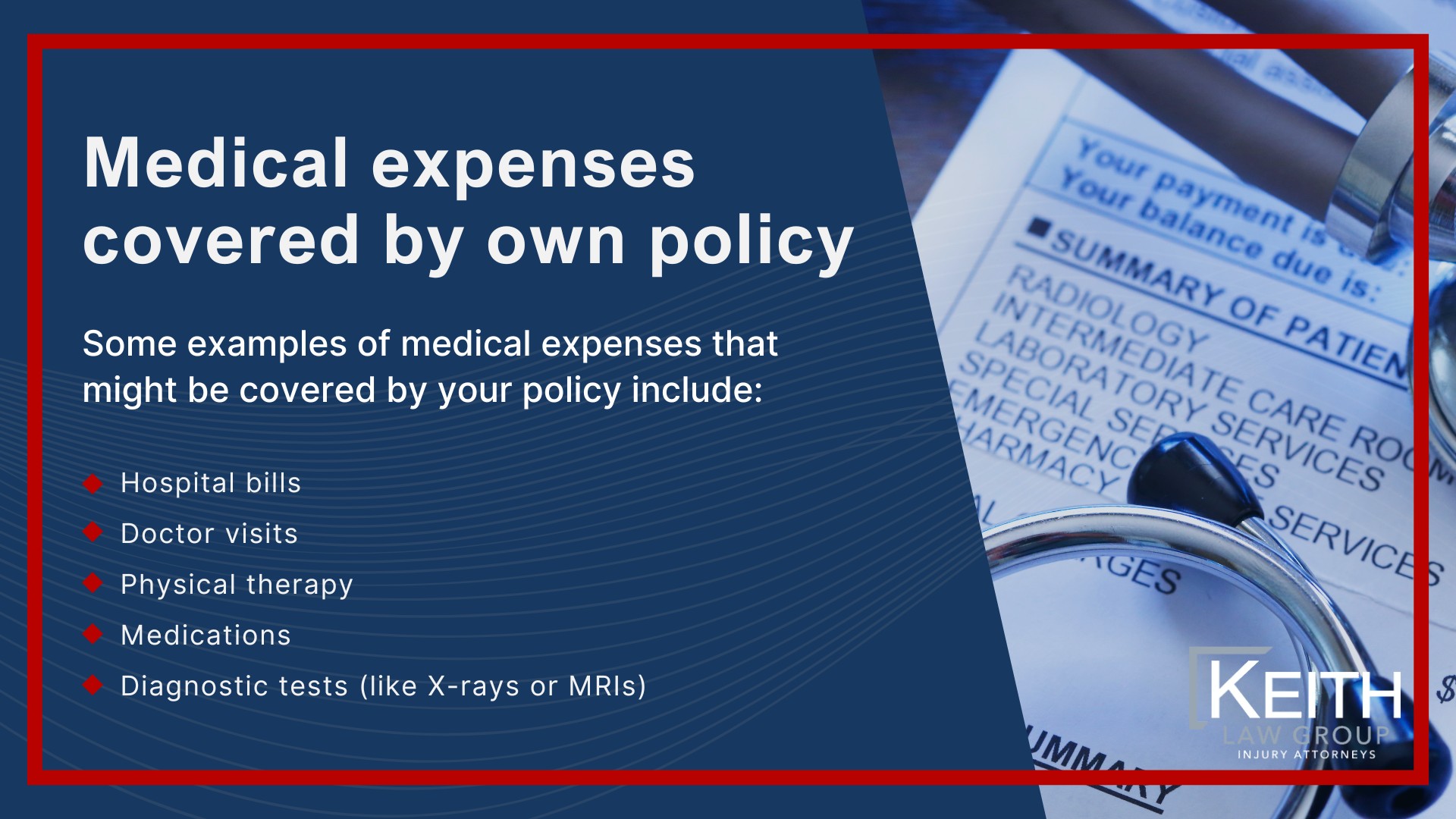
Some examples of medical expenses that might be covered by your policy include:
- Hospital bills
- Doctor visits
- Physical therapy
- Medications
- Diagnostic tests (like X-rays or MRIs)
Keep in mind that every policy has its own limits and exclusions; it’s essential to review your specific plan details to know what’s covered and what isn’t.
Liability coverage requirements
Arkansas law requires drivers to carry a minimum amount of liability insurance, which helps cover damages and injuries you cause to others in a car accident.
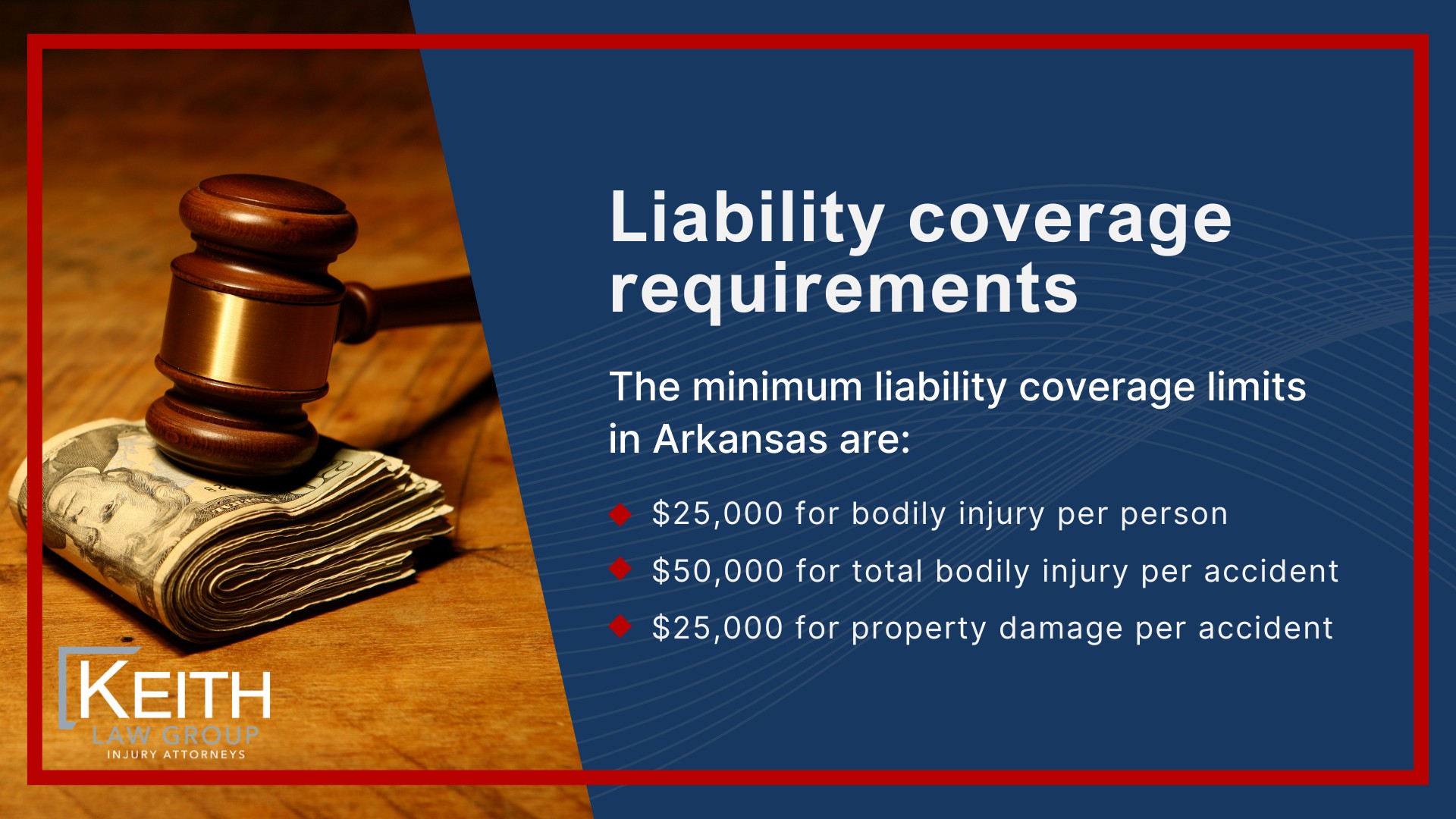
The minimum liability coverage limits in Arkansas are:
- $25,000 for bodily injury per person
- $50,000 for total bodily injury per accident
- $25,000 for property damage per accident
These limits represent the minimum amounts required by law; drivers can choose to purchase higher limits if they wish.
It’s important to note that if your liability coverage isn’t sufficient to cover the other party’s damages, you could be held personally responsible for any remaining costs.
Uninsured/underinsured motorist protection
Although auto insurance is mandatory in Arkansas, some drivers still operate vehicles without proper coverage.
To protect yourself from financial losses caused by uninsured or underinsured motorists, it’s wise to consider adding uninsured/underinsured motorist (UM/UIM) protection to your policy.
UM/UIM coverage can help pay for your medical expenses and property damage if you’re involved in an accident with a driver who either has no insurance or lacks enough coverage to fully compensate you for your losses.
Just like with PIP coverage, UM/UIM is not required by law in Arkansas but can provide valuable financial protection in case of an accident.
Determining When to Settle vs. When to Sue: Examples
Severity of Injuries Sustained
One crucial factor in deciding whether to settle or sue in a car accident lawsuit is the severity of the injuries sustained:
- Minor injuries: In many cases, if the injuries are relatively minor and can be recovered from quickly, it may be more advantageous to settle. This is because the settlement process tends to be faster and less expensive than going through a court case.
- Severe injuries: On the other hand, if you’ve suffered severe or life-altering injuries, it might be worth pursuing a legal case. This is especially true if you believe that the settlement amounts being offered do not adequately compensate for your long-term pain and suffering.
For example, imagine two different scenarios:
- A person suffers whiplash in a car accident and makes a full recovery within a few weeks. They might choose to settle their case since their medical expenses and lost wages will likely be minimal.
- Another person sustains traumatic brain injury (TBI) due to an accident caused by another driver’s negligence. They could require extensive rehabilitation and ongoing care for years or even decades, so they might decide that suing is their best option.
Disagreements Over Fault
Sometimes there are disagreements between parties involved in an accident over who was at fault.
In these situations, it’s essential to weigh the risks and benefits of settling versus suing:
- If both parties can agree on fault through negotiation or mediation, then reaching a settlement may be quicker and less expensive than going through a court case.
- However, if one party refuses to accept responsibility for causing the accident or disputes your version of events, suing may become necessary.
Keep in mind that proving liability in court can be challenging without sufficient evidence like police reports, witness statements, or video footage from traffic cameras.
Inadequate Settlement Offers
Another important consideration is whether the settlement offers you receive are adequate to cover your damages, including medical bills, lost wages, and pain and suffering:
- If you believe that the settlement amount being offered is too low, it might be worth pursuing a court case to try and secure a higher compensation.
- However, remember that going through a court case can be lengthy and expensive. It’s essential to weigh the potential benefits of a higher settlement value against the risks associated with litigation.
Long-Term Consequences Considered
When deciding between settling or suing in a car accident lawsuit, it’s vital to consider the long-term consequences of your decision:
- By settling quickly, you may be able to move on from the accident more rapidly. However, this could also mean accepting less compensation than you deserve for your injuries and losses.
- On the other hand, pursuing a legal case can take months or even years before reaching resolution. This can lead to ongoing stress and potentially higher legal costs.
For example, if someone has significant medical expenses due to their injuries but chooses to settle quickly for an inadequate amount because they want closure or need money immediately, they may struggle financially down the road as medical bills continue piling up.
Weighing Risks and Benefits
Ultimately, deciding whether to settle or sue in a car accident lawsuit involves weighing various risks and benefits:
- Settlement process: Settling tends to be faster and less costly than going through a court case. This is why most car accident lawsuits settle prior to going to court. However, it may result in lower compensation amounts.
- Court case: Suing can potentially yield higher settlements but comes with increased time commitment, stress levels, legal fees, and no guarantee of success.
- Statute of limitations: Keep in mind that there is typically a deadline (statute of limitations) by which you must file your lawsuit; otherwise, you lose your right to pursue compensation through legal action.
Factors Influencing Arkansas Car Accident Settlements and Potential Outcomes
Degree of Fault Established
The degree of fault established in an Arkansas car accident lawsuit plays a significant role in determining the outcome of personal injury settlements.
In Arkansas, the modified comparative negligence rule is followed, which means that:
- If you are found to be 50% or more at fault for the accident, you cannot recover any damages.
- If you are less than 50% at fault, your compensation will be reduced by your percentage of fault.
For example, if you’re awarded $100,000 but found to be 25% at fault, your payout would be reduced to $75,000.
The degree of fault can greatly affect the amount received in a settlement.
Extent of Property Damage
Another factor that influences the outcome of an Arkansas car accident lawsuit is the extent of property damage.
This includes:
- Vehicle repair or replacement costs
- Damage to personal belongings inside the vehicle
- Costs associated with rental cars or alternative transportation
Insurance adjusters often use property damage as a starting point when calculating payouts. The more extensive and costly the damage, the higher your potential settlement may be.
Medical Bills Incurred
Medical expenses resulting from injuries sustained in a car accident can significantly impact settlement amounts.
These costs might include:
- Hospital stays
- Surgeries
- Physical therapy
- Prescription medications
- Ongoing medical care
When negotiating a settlement, it’s essential to consider both past and future medical bills related to your injuries.
An experienced personal injury attorney can help ensure all relevant expenses are included in your claim.
Lost Wages Due to Injury
Lost wages due to injury is another critical factor that affects car accident settlements in Arkansas.
When an injured person is unable to work because of their injuries:
- They may lose income from missed workdays.
- Their earning capacity could be permanently reduced if they cannot return to their previous job or are forced into a lower-paying position.
To accurately calculate lost wages, you’ll need documentation such as pay stubs and a letter from your employer outlining missed work time and any resulting decrease in earnings.
This information will help strengthen your case and potentially increase your settlement amount.
Pain, Suffering, and Emotional Distress
In Arkansas car accident lawsuits seeking damages, these factors play a large role.
When seeking compensation, the final settlement amount can be significantly impacted by the severity of pain, suffering, and emotional distress you are able to prove.
These damages are considered non-economic because they don’t have a specific dollar value attached to them.
Factors that may influence these damages include:
- Severity of the injuries
- Length of recovery time
- Impact on daily life and activities
It’s crucial to document the physical pain and emotional toll caused by the accident when pursuing compensation for these damages.
Keep a journal detailing how your injuries affect your day-to-day life, including any activities you’re unable to participate in due to pain or discomfort.
Punitive damages may also be awarded in some cases where the at-fault driver’s actions were particularly reckless or malicious.
While rare, punitive damages can significantly increase the overall payout received in a car accident lawsuit.
Writing a Demand Letter for an Arkansas Auto Accident Settlement
Clearly Stating Facts
When drafting a demand letter for a car accident settlement, it’s crucial to lay out the facts of the incident clearly and concisely.
This includes:
- Date and time of the accident
- Location of the collision
- Weather conditions at the time
- Description of how the accident occurred
- Names and contact information of any witnesses
By providing these details in your demand letter, you’ll help paint a clear picture of what happened during the car accident, making it easier for insurance adjusters or attorneys to understand your claim.
Detailing Injuries Sustained
In addition to outlining the facts surrounding your car accident, your demand letter should also detail any serious injuries you sustained as a result of the car crash.
Be sure to include:
- The type(s) and severity of your injuries
- Medical treatment received (e.g., hospitalization, surgery, physical therapy)
- Any ongoing or future medical care required due to your injuries
- How these injuries have impacted your daily life (e.g., inability to work, difficulty performing routine tasks)
Providing this information will help establish the extent of harm caused by the accident and support your claim for damages.
Calculating Damages Sought
Your demand letter must also specify the amount you’re seeking in compensation for damages related to your car accident.
To calculate this figure accurately, consider factors such as:
- Medical expenses (both current and anticipated future costs)
- Lost wages due to missed work or reduced earning capacity
- Property damage (e.g., vehicle repairs or replacement)
- Pain and suffering endured as a result of your injuries
By itemizing these damages in detail, you’ll be better equipped to justify your requested maximum compensation amount when negotiating with insurance adjusters or opposing counsel.
Providing Supporting Documentation
To strengthen your car accident claim further, be sure to include any relevant documentation that supports your case.
This may consist of:
- Medical records and bills
- Proof of lost wages (e.g., pay stubs, employer statements)
- Photos or videos from the accident scene
- Witness statements or police reports
Including these documents with your demand letter can help substantiate your claim and demonstrate the extent of your losses.
Requesting Prompt Response
Finally, when concluding your demand letter, it’s essential to request a prompt response from the recipient.
Typically, you’ll want to give them a specific timeframe (e.g., 30 days) in which to respond with their settlement offer or other correspondence related to your car accident lawsuit.
By setting a clear deadline for their reply, you’ll increase the likelihood of receiving a timely response and help expedite the car accident settlement process.
Navigating the Arkansas Car Accident Lawsuit Process: Discovery and Trial
Exchange of Evidence
During the discovery phase of a car accident lawsuit process, both parties gather and exchange evidence to build their cases.
This crucial step helps each side understand the strengths and weaknesses of their arguments, ultimately shaping their strategies for trial:
- Requesting documents like police reports, medical records, and insurance policies
- Obtaining witness statements and photographs from the accident scene
- Analyzing physical evidence such as vehicle damage or skid marks on the road
The exchange of evidence can be time-consuming but is essential in ensuring a fair court action.
It allows both parties to prepare thoroughly for trial by knowing what information will be presented by the opposition.
Depositions and Interrogatories
Depositions and interrogatories are two (2) common methods used during the discovery phase to gather crucial information from witnesses, experts, and other involved parties:
- Depositions are formal interviews conducted under oath where attorneys ask questions related to the case. They provide valuable insights into potential testimony that may be presented at trial.
- Interrogatories are written questions sent between parties that must be answered under oath within a specified timeline. These help clarify facts about the case without requiring in-person meetings.
Both depositions and interrogatories offer opportunities for attorneys to probe deeper into specific issues or discrepancies in witness statements, which can significantly impact cases moving forward.
Expert Witness Testimony
Expert witnesses play a critical role in car accident lawsuits by providing specialized knowledge or expertise relevant to specific aspects of a case.
Their testimony can carry significant weight when presenting arguments in court:
- Medical professionals explaining injuries sustained during an accident
- Accident reconstruction specialists analyzing how events unfolded
- Economists projecting future lost wages or earning capacity due to injury
By utilizing expert witness testimony, attorneys can strengthen their cases with objective opinions from knowledgeable sources that jurors or judges may find persuasive.
Presenting Case in Court
Once the discovery phase is complete, the car accident lawsuit process moves to trial.
During this stage, both parties present their cases before a jury or judge, who will ultimately decide the outcome:
- Opening statements outlining each side’s arguments and evidence
- Direct examination of witnesses and presentation of physical evidence
- Cross-examination to challenge opposing witness credibility or testimony
Trial proceedings can be lengthy and complex, but they provide an essential opportunity for each party to make their case based on the evidence gathered during discovery.
Jury Verdict or Judge’s Decision
At the conclusion of a trial, either a jury or judge will make a formal finding on whether one party is liable for damages resulting from the car accident.
This decision can have significant implications for both parties involved in the lawsuit:
- If found liable, defendants may be responsible for compensating plaintiffs for medical bills, lost wages, property damage, and pain and suffering.
- In some cases, punitive damages may also be awarded as punishment for particularly negligent behavior.
The verdict reached in court marks the end of a long and often challenging journey through the Arkansas car accident lawsuit process.
It serves as a reminder that every step—from discovery to trial—plays an essential role in determining justice under Indiana law.
Dealing with Insurance Carrier Counteroffers
Evaluating Counteroffer Fairness
When you receive a counteroffer from the insurance provider, it’s essential to evaluate its fairness.
Keep in mind that insurance companies are looking out for their bottom line, and the initial offer might not be enough to cover your expenses.
Here are some steps to take after a car accident when evaluating the fairness of a counteroffer:
- Review your medical bills and other expenses related to the car accident.
- Consider any future medical treatments or ongoing care costs.
- Calculate lost wages due to time off work and potential loss of earning capacity.
- Assess pain and suffering compensation based on severity and duration.
Compare these figures with the settlement offer provided by the insurer.
If there is a significant gap between what you need and what they’re offering, it’s time to negotiate for a better and fair settlement amount.
Negotiating for a Better Settlement
Negotiating with an insurance adjuster can be intimidating, but remember that you have every right to fight for fair compensation.
Follow these tips when negotiating with an insurance company:
- Be prepared: Gather all relevant documents like medical records, police reports, witness statements, and proof of lost wages.
- Stay calm: Approach negotiations professionally and avoid getting emotional or confrontational.
- Stick to the facts: Focus on presenting evidence that supports your claim rather than making emotional pleas.
- Be patient: Negotiations can take time; don’t feel pressured into accepting an inadequate offer.
If negotiations stall or you’re unsure about how to proceed, you may want to seek legal advice from a lawyer experienced in car accident lawsuits.
Considering Mediation or Arbitration
If negotiations aren’t progressing as desired, mediation or arbitration may be viable alternatives:
- Mediation: A neutral third party (the mediator) helps both sides reach an agreement by facilitating communication and offering possible solutions. Mediation is non-binding; if no agreement is reached, you can still pursue a trial.
- Arbitration: Similar to mediation, but the arbitrator’s decision is usually binding. Both parties present their case, and the arbitrator makes a final ruling.
Before agreeing to either option, consult with a legal professional to discuss potential risks and benefits.
Knowing When to Accept an Offer
Deciding when to accept a settlement offer can be challenging.
Here are some factors to consider:
- Is the offer fair and reasonable based on your expenses and damages?
- How strong is your case if it goes to trial? Consider evidence, liability, and witness credibility.
- What are the potential costs of going to trial (e.g., attorney fees, court costs)?
- How long are you willing to wait for compensation?
If you’re in auto accident lawsuits and unsure whether accepting an offer is in your best interest, consult with a lawyer experienced in car accident lawsuits.
Preparing for Potential Trial
In some cases, negotiations may fail or offers may remain inadequate.
If this occurs, you must be prepared for the possibility of going to trial:
- Hire an attorney: A skilled car accident attorney can help build your case and represent your interests in court.
- Gather evidence: Compile all relevant documentation like medical records, police reports, photos of the accident scene, etc.
- Prepare witnesses: Ensure any witnesses are ready and able to testify on your behalf.
- Develop a trial strategy: Work with your attorney to create a compelling argument that supports your claim for compensation.
Facing off against insurance companies in court can be daunting – however, with proper preparation and legal representation, you can increase your chances of receiving fair compensation for your car accident lawsuit.
Average Car Accident Settlement Amounts in Arkansas
Range of Potential Settlements
In Arkansas, car accident settlements can vary greatly depending on the specifics of each case.
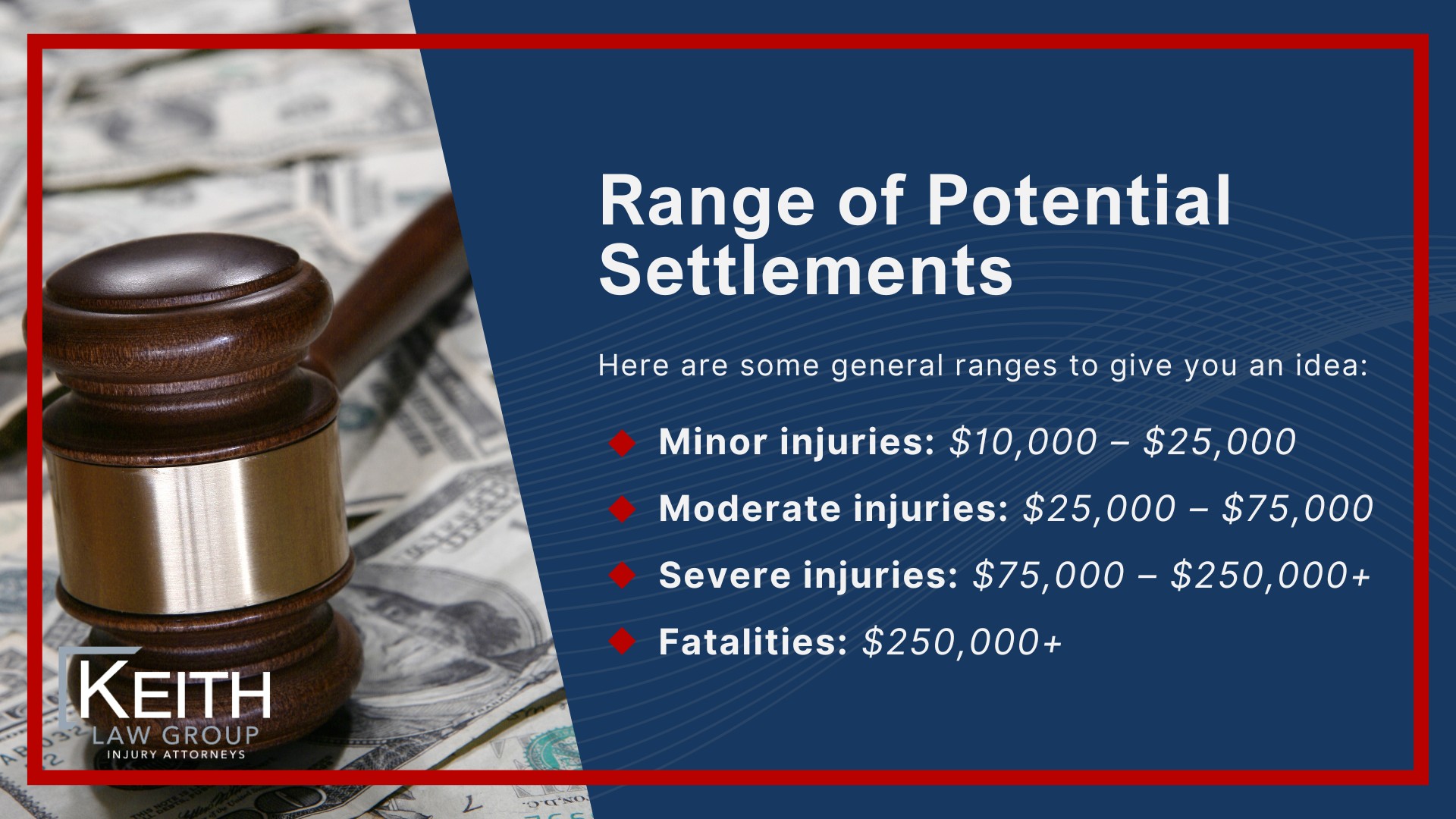
Here are some general ranges to give you an idea:
- Minor injuries: $10,000 – $25,000
- Moderate injuries: $25,000 – $75,000
- Severe injuries: $75,000 – $250,000+
- Fatalities: $250,000+
Keep in mind that these are just ballpark figures and every case is unique.
It’s important not to rely solely on these numbers when estimating your potential settlement.
Factors Affecting Settlement Amounts
Several factors can influence the amount of a car accident settlement in Arkansas.
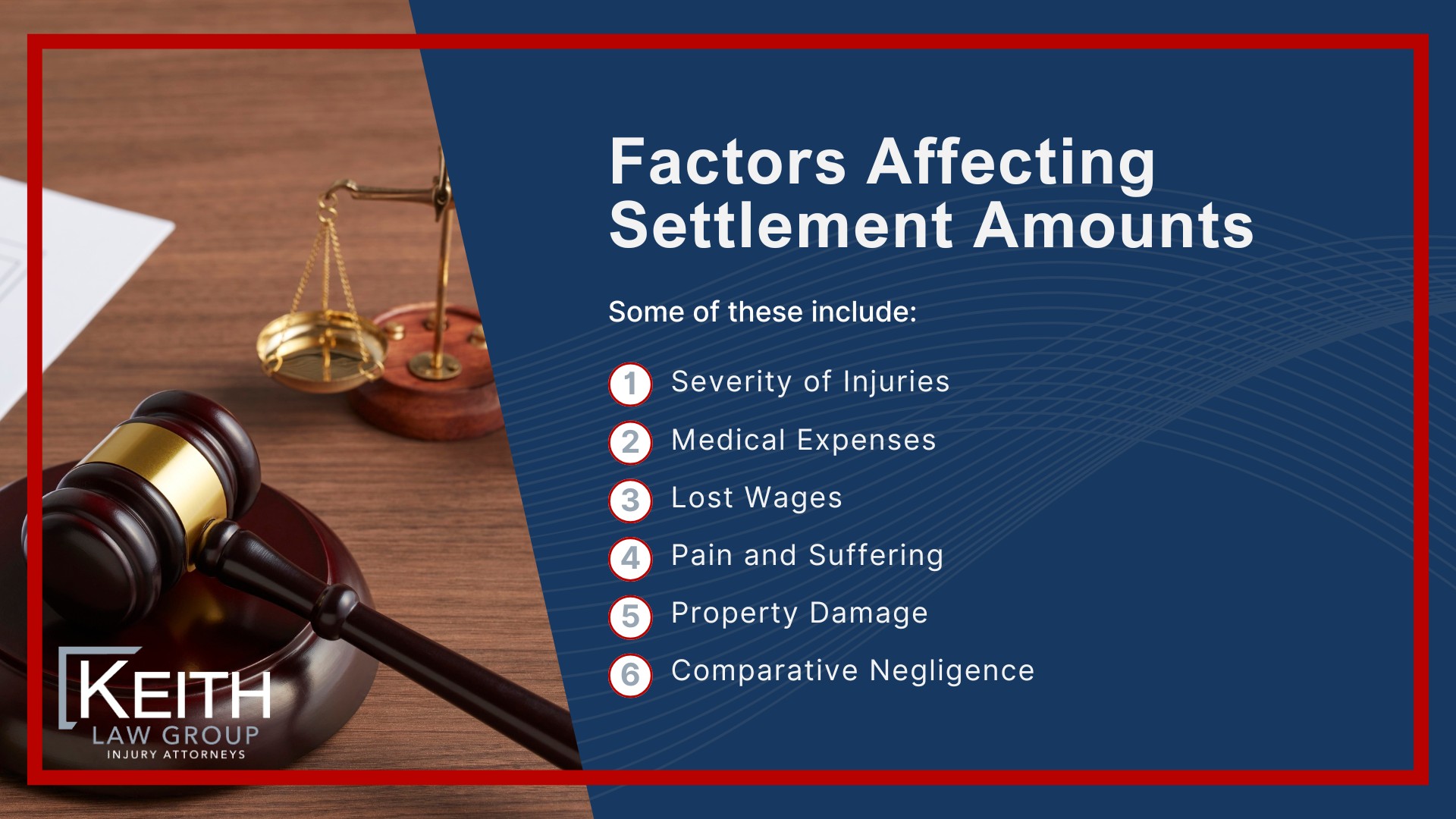
Some of these include:
- Severity of Injuries: The more severe the injury sustained in the accident, the higher the potential settlement amount.
- Medical Expenses: Higher medical costs generally lead to higher settlements.
- Lost Wages: If an injured party cannot work due to their injuries, they may be entitled to compensation for lost wages.
- Pain and Suffering: Emotional distress and physical pain suffered as a result of the accident can also increase a settlement amount.
- Property Damage: The cost to repair or replace damaged vehicles or other property is often factored into a settlement.
- Comparative Negligence: In Arkansas, if you are found partially at fault for an accident, your potential settlement may be reduced based on your percentage of fault.
Comparing Similar Cases’ Outcomes
One way to get a better understanding of what your car accident lawsuit might be worth is by comparing it to similar cases with known outcomes.
However, keep in mind that no two cases are exactly alike and past results don’t guarantee future outcomes.
You can research previous personal injury cases online or consult with an experienced personal injury attorney who can provide insight into how your case might compare to others.
Remember, though, that even similar cases can have vastly different outcomes due to the unique circumstances of each situation.
Importance of Individual Case Details
When estimating a car accident settlement amount, it’s crucial to consider the specific details of your case.
Factors such as the severity of injuries, medical expenses, lost wages, and pain and suffering will all play a significant role in determining your potential settlement.
For example:
- If you suffered a traumatic brain injury in an accident caused by another driver’s negligence, you may be entitled to a larger settlement than someone with minor injuries.
- If you were unable to work for several months after the accident and lost substantial income as a result, this would likely increase your potential settlement amount.
It’s essential to thoroughly document all aspects of your case and work closely with an experienced personal injury attorney who can help you navigate the complexities of calculating an appropriate settlement.
No Guarantee of Specific Amount
While researching average car accident settlements and comparing similar cases can give you a general idea of what your lawsuit might be worth, there is no guarantee that you will receive a specific amount.
Every case is unique, and many factors can influence the outcome.
To ensure that you receive fair compensation for your injuries and losses, it’s critical to work with an experienced personal injury attorney who understands Arkansas law and has experience handling car accident lawsuits.
They will advocate on your behalf and help guide you through the legal process from start to finish.
Contacting an Experienced Arkansas Car Accident Lawyer for Guidance
When dealing with the aftermath of a car accident in Arkansas, it’s crucial to have an experienced attorney by your side.
They can help you navigate the complex legal landscape, from understanding common causes of accidents and reporting requirements to determining whether to settle or sue.
An experienced attorney will ensure you meet filing deadlines and understand settlement timelines.
They’ll also help you comprehend no-fault insurance and personal injury protection (PIP) in Arkansas, which can greatly impact your case.
Your lawyer will guide you through factors influencing settlements and potential outcomes, as well as assist in writing a strong demand letter for an auto accident settlement.
Throughout the lawsuit process, including discovery and the court trial itself, they’ll be there to support you every step of the way.

Dealing with insurance carrier counteroffers can be challenging – however, having a knowledgeable attorney on your side ensures that you receive fair compensation for your injuries.
Furthermore, they can provide insight into averages for car accident insurance claims and average settlement amounts in Arkansas so that you know what to expect.
In conclusion, don’t hesitate to contact an experienced Arkansas car accident attorney for guidance throughout this difficult time.
Their expertise will prove invaluable as they advocate for your best interests and work towards securing the compensation you deserve.
Frequently Asked Questions
-
Start by asking friends or family members for recommendations or conduct online research to find attorneys with positive reviews and experience handling cases similar to yours.
Schedule consultations with potential lawyers to discuss their approach and fees before making a decision.
-
Bring any relevant documentation related to your case such as police reports, medical records, photos of the accident scene or vehicle damage, witness contact information, insurance policy information, and any correspondence between yourself and insurance companies or other parties involved in the incident.
-
Many car accident attorneys work on a contingency fee basis, which means they only get paid if they successfully recover compensation for you.
The fee is typically a percentage of the settlement or award. Make sure to discuss fees and payment structure during your initial consultation.
-
The timeline for resolving a car accident lawsuit varies depending on factors such as the complexity of the case, the willingness of parties to settle, and court schedules.
It could take anywhere from several months to several years.
-
In a car accident lawsuit, you may be able to recover economic damages (medical expenses, lost wages, property damage), non-economic damages (pain and suffering, emotional distress), and punitive damages (in cases involving extreme negligence or malicious conduct).
-
Yes, under Arkansas’ modified comparative negligence rule, you can still receive compensation if you were partially at fault for the accident.
However, your recovery will be reduced by your percentage of fault for vehicle accident.
-
Your attorney will help guide this decision based on factors such as the strength of your case, potential settlement offers from the other driver’s insurance company or other parties involved in the incident, and how much risk you’re willing to accept in pursuing a trial verdict.
-
Winning a car accident lawsuit can be challenging, as it requires gathering substantial evidence, proving negligence, and navigating complex legal procedures.
To increase your chances of success, it is essential to consult with an experienced attorney who can guide you through the process and help build a strong case.
All Posts for the Car Accident Lawsuit Legal Guide
Practice Areas
You pay
Nothing
unless we win
Do You Have A Case?
Recent Legal Posts & Articles
Recent Legal Guides

Choose Us For Your Personal Injury Case
- Available 24/7
- No Upfront Fees
- Free Case Evaluation
- No Fees Unless We Win!
